2015-2016全国初中英语中考英语热点词高频词及词组辨析【通用版】
- 格式:doc
- 大小:143.47 KB
- 文档页数:17
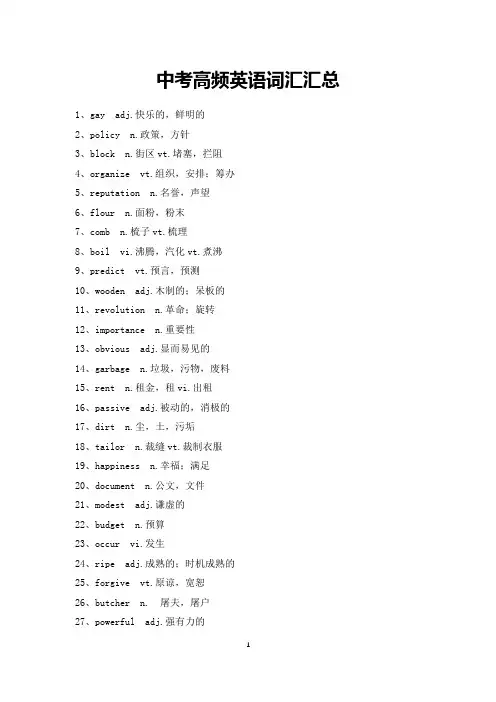
中考高频英语词汇汇总1、gay adj.快乐的,鲜明的2、policy n.政策,方针3、block n.街区vt.堵塞,拦阻4、organize vt.组织,安排;筹办5、reputation n.名誉,声望6、flour n.面粉,粉末7、comb n.梳子vt.梳理8、boil vi.沸腾,汽化vt.煮沸9、predict vt.预言,预测10、wooden adj.木制的;呆板的11、revolution n.革命;旋转12、importance n.重要性13、obvious adj.显而易见的14、garbage n.垃圾,污物,废料15、rent n.租金,租vi.出租16、passive adj.被动的,消极的17、dirt n.尘,土,污垢18、tailor n.裁缝vt.裁制衣服19、happiness n.幸福;满足20、document n.公文,文件21、modest adj.谦虚的22、budget n.预算23、occur vi.发生24、ripe adj.成熟的;时机成熟的25、forgive vt.原谅,宽恕26、butcher n. 屠夫,屠户27、powerful adj.强有力的28、potential adj.潜在的n.潜能29、liquid n.液体a.液体的,流动的30、generous adj.慷慨的,宽厚的31、counter n.柜台,计数器32、pump n.泵vt.用泵抽,打气33、equal adj.相等的,平等的34、maximum n.最大量a.最大的35、climate n.气候36、loose adj.宽松的;自由的37、favor n.好感,赞同,恩惠38、valley n.山谷,流域39、confuse vt.使混乱,混淆40、dictation n.口授41、forecast n.预测,预报vt.预示42、solar adj.太阳的,日光的43、topic n.题目;论题,话题44、tip vt.轻击vi.给小费n.小费45、mourn vi.哀痛,哀悼46、attitude n.态度,看法,姿势47、companion n.同伴48、pretend vt.假装,装作vi.假装49、passer-by n. 过路人50、province n.省51、broadcast n.广播,播音52、wire n.金属线,电缆53、combine vt.使结合,兼有54、shot n.射击,发射;投篮55、junior adj.年少的,地位较低的n.晚辈56、admit vt.承认,准许…进入57、pipe vt.用管道输送n.管子,导管;烟斗58、outdoor adj./ad.户外的,野外的59、reply vi.回答,答复n.答复60、found vt.创立,创办61、anxious adj.忧虑的,渴望的62、selfish adj.自私的,利己的63、bother vt.烦扰,迷惑n.麻烦64、cushion n.垫子,坐垫,靠垫65、attend vt.出席,照顾,护理66、drunk a.醉的,陶醉的67、strength n.力量,力气68、branch n.树枝,分部,分支69、refer vt.求助于vi.谈到;参考,查阅70、port n.港口71、discriminate vt.vi.区别对待,歧视72、outdoors adv.在户外n.户外73、crop n.农作物,庄稼74、typist n.打字员75、pack vt.捆扎,打包;挤满n.包76、firm adj.坚定的n.公司,商号77、bake vt.烤,烘,烧硬78、grand adj.宏伟的,重大的79、update vt.更新,使现代化n.现代化,更新80、base n.基础,底层,基地81、speak的过去分词82、surround vt.包围,环绕83、fountain n.泉水,喷泉84、mass n.大量;群众85、sink vi.下沉,降低n.水槽,水池86、architecture n.建筑学,建筑式样87、thinking n.思考;想法,见解88、self n.自我,自己89、button n.扣子,按钮vt.扣紧90、cave n.山洞,洞穴,窑洞91、tire vi.疲劳;厌倦n.轮胎92、badminton n.羽毛球93、committee n.委员会94、aspect n.方面,样子,外表95、burden n.担子,负担,装载量96、farther adv.更远地a.更远的97、aim vi.瞄准,针对,致力98、apart adv.相隔,分开,除去99、fluent adj.流利的,流畅的100、willing adj.心甘情愿的101、unfair adj.不公平的102、disadvantage n.缺点,弱点103、intelligence n.智力,理解力,情报104、jar n.罐子,坛子,广口瓶105、wage n.工资,报酬106、rescue vt.援救,营救107、measure vt.量,测量n.测量;措施108、suck vt.吸,吮109、kindergarten n.幼儿园110、instant n.瞬间a.立即的111、reserve vt.储备,保留;预定112、occupation n.占领,占据;职业,工作113、root n.根(部);根源vi.生根,扎根114、eastern adj.东方的,朝东的115、sensitive adj.敏感的,灵敏的116、petrol n.汽油117、mental adj.智力的;精神的118、literature n.文学(作品)119、means n.方法,手段120、tough adj.坚韧的;健壮的121、cure vt.医治n.治愈122、tin n.锡;罐头123、amuse vt.逗…乐,给…娱乐124、scare vt.惊吓vi.受惊125、oxygen n.氧,氧气126、tradition n.传统,惯例127、abstract adj.抽象的n.摘要128、practical adj.实用的129、moral adj.合乎道德的n.道德,品行130、inform vt.通知,向…报告131、contribute vt.捐献,捐助,投稿132、belly n.腹部,胃133、convince vt.使确信,使信服134、secure adj.安全的135、access n.接近,通道,入口136、cream n.奶油137、remind vt.提醒138、librarian n.图书馆馆员139、angle n.角,角度140、evaluate vt.评价,估…的价141、poison n.毒药vt.毒害;投毒142、determine vt.决定,决心143、sum n.总数;金额vi.共计144、explore vt.vi.探险,探索145、pole n.杆,柱146、smooth adj.平滑的,平静的147、consist vi.由…组成148、united adj.一致的;联合的149、positive adj.确定的;积极的;正的150、thus adv.如此,这样;因而151、stare vi.凝视152、pill n.药丸153、original adj.最初的;新颖的n.创新154、wind n.风155、performance n.履行;表演;表现156、affair n.事情,事件,事务157、voyage n.航海vi.航海,航空158、harbour n.港159、tend vi.走向,趋向160、swallow vt.吞,咽vi.吞,咽n.燕子161、beginning n.开始,开端,起源162、quantity n.数量;大量163、entertainment n. 娱乐,款待,娱乐表演164、exhibition n.展览,陈列,展览会165、belong vi.属于,附属166、wipe vt.揩,擦n.揩,擦167、noisy adj.嘈杂的,喧闹的168、description n.描述;形容169、earn vt.挣得,获得170、construction n.建造,建筑物171、remote adj.遥远的172、consume vt.消耗,消费173、upset vt.使不适,使心烦n.混乱174、fist n.拳头175、concentrate vt.集中,聚集,浓缩176、net adj.净的,纯的n.网,网状物177、theme n.题目;词干;主旋律178、broad adj.宽的,阔的,广泛的179、jam n.果酱180、afterward (s) adv. 后来,以后,随后181、tense adj.紧张的;拉紧的n.时态182、shade n.树荫;遮光物vi.荫蔽183、entrance n.入口,进入184、virus n.病毒185、evidence n.根据,证据,证人186、elect vt.选举,推选187、sigh vi.叹气,叹息n.叹息188、worthwhile adj.值得的189、deliver vt.投递,送交190、temple n.神殿,庙宇;太阳穴191、ban n. 禁令vt. 禁止,取缔192、arrival n.到达,到达者193、bush n.灌木194、sailor n.海员,水兵195、lately adv.最近196、shave vt.剃,刮vi.修面n.刮脸197、studio n.工作室,播音室198、nut n.坚果199、wedding n.婚礼200、onto prep.到…上201、religion n.宗教信仰202、paragraph n.(文章的)段,节203、matter n.事情;物质vi.要紧,有关系204、fence n.栅栏205、blank adj.空白的n.空白206、hammer n.锤子vt.锤击207、mix vt.使混合;混淆208、whistle n.口哨vi.吹口哨209、nowhere adv.任何地方都不210、socialism n.社会主义211、web n.(蜘蛛)网,网状物;网络212、emergency n.紧急情况,突然事件213、telescope n.望远镜214、anyhow adv.无论如何215、conduct n.举止,行为,指导216、meanwhile adv.同时,当时217、stable adj.稳定的,安定的n.马厩,马棚218、download n. 下装,卸载219、agent n.代理人,代理商220、bargain n.交易vi.议价,成交221、simply adv.简单地;朴素地;仅仅,只不过222、leak vi.漏;泄露n.漏洞223、mountainous adj.多山的224、steam n.蒸汽vi.蒸发vt.蒸煮225、arrange vt.筹备,整理,调解226、later adv.后来227、misunderstand vt.误解,误会228、rank n.军衔vt.归类于229、mankind n.人类230、slight adj.细长的;轻微的231、player n.表演者,比赛者232、flow vi.流动,飘扬,涨潮233、access n.接近,通道,入口234、scene n.情景;景色235、commercial adj.商业的,商品化的236、minimum n.最小量a.最小的237、reading n.阅读;读物238、ambition n.雄心,抱负,野心239、foolish adj.愚蠢的240、lung n.肺241、charge vt.索价,控告n.费用242、host n.主人,东道主243、advance vi.前进,提高n.进展244、engine n.发动机,引擎245、eager adj.渴望的,热切的246、midday n.中午247、drown v.溺死248、roll vi.滚动,转动n.一卷;名册249、brake n.闸,刹车vi.制动250、disaster n.灾难251、scientific adj.科学的252、process n.过程vt.处理253、react vi.反应254、carpet n.地毯,毡毯,毛毯255、violent adj.猛烈的,狂暴的256、award n.奖,奖品,判定257、relative adj.有关系的;相对的n.亲戚,亲属258、crowd n.群,大众,一伙人259、immigrate v.移民260、finance n.财政,金融,财源261、frequent adj.经常的262、curtain n.帘,窗帘,幕(布)263、revise vt.校订,修改264、greatly adv.大大地,非常地;伟大地,崇高地265、respect vt.尊敬,尊重n.尊敬266、pause n.中止vi.中止,暂停267、available adj.可利用的,通用的268、pence n. penny的复数269、fierce adj.凶猛的,狂热的270、actress n.女演员271、chief adj.主要的,首席的272、delight n.快乐vt.使高兴273、symbol n.象征;符号274、familiar adj.熟悉的275、grasp vt.抓紧,掌握n.抓276、title n.标题,题目;称号,头衔277、apply vt.应用,实施,使用278、sex n.性别,性279、ladder n.梯子280、appointment n.任命,约定,约会281、split vt.劈开282、struggle n.斗争;奋斗vi.斗争;奋斗283、globe n.地球,世界,地球仪284、gradual adj.逐渐的,渐进的285、detect vt.察觉,发觉,侦察286、thief n.窃贼,偷窃犯287、interrupt vt.打断,打扰,中止288、curious adj.好奇的,稀奇古怪的289、journalist n.记者,新闻工作者290、attempt vt.尝试,试图n.企图291、peaceful adj.和平的;平静的292、biology n.生物学,生态学293、file n.档案vt.把…归档294、bend vt.使弯曲vi.弯曲295、march n.三月296、extremely adv.极其,非常297、bench n.长凳,条凳,工作台298、million num.百万299、actor n.男演员300、urban adj.都市的301、visa n.签证;信用卡302、conclusion n.结论,推论,结尾303、flight n.航班,飞行,逃跑304、tolerate vt.忍受,容忍305、jungle n.丛林,密林306、cattle n.牛,牲口,家畜307、drill n.钻头,操练vi.钻孔308、electricity n.电,电流309、pleased adj.高兴的310、complex adj.结合的,复杂的311、bathe vt.给…洗澡,弄湿312、badly adv.坏,差,严重地313、fool n.傻子vt.欺骗,愚弄314、audience n.听众,观众315、dormitory n.集体寝室,宿舍316、greet vt.问候,招呼,反应317、outline n.轮廓;大纲318、destroy vt.破坏,消灭319、grocery n.杂货店320、motor n.发动机,机动车321、range vi.变动,变化n.范围322、petrol n.汽油323、variety n.多样化,种类324、strike vt.打,击;罢工n.罢工;打击;325、pattern n.式样,模型326、graduate n.大学毕业生vi.毕业327、pillow n.枕头328、impress vt.给…深刻印象329、astonish vt.使惊讶,使吃惊330、opinion n.意见,看法331、teenager n.青少年332、starve vi.饿死vt.使饿死333、decorate vt.装饰334、highway n.公路,大路335、persuade vt.说服336、exchange vt.交换,交流n.交换337、rough adj.表面不平的;粗略的;大致的338、politics n.政治339、cash n.现金,现款340、spy n.间谍,特务vt.侦察,监视341、error n.错误,谬误,差错342、blanket n.毯子343、actual adj.实际的,现行的344、midnight n.午夜345、case n.情况,事实,病例346、possibly adv.可能地,也许347、deadline n. 最终期限348、grocer n.杂货商349、expand vt.扩大,使膨胀350、perform vt.执行;演出351、sincere adj.真诚的,真挚的352、gas n.煤气,气体353、political adj.政治上的354、fax n.vt. 传真355、decrease vi.n.减少356、reward n.报答;报酬vt.报答;酬金357、convenient adj.便利的,方便的358、bare adj.赤裸的,仅仅的359、generation n.一代,一代人,产生360、dislike vt.n.不喜爱,厌恶361、trap n.陷阱;诡计vt.诱骗362、liberate vt.解放,释放363、summary adj.简短的,扼要的n.摘要,总结364、survive vt.幸免于vi.活下来365、glance vi.看一下n.一瞥366、sympathy n.同情,同情心367、neat adj.整洁的;简洁的368、precious adj.珍贵的,宝贵的369、seek vt.寻找,探索370、optimistic adj.乐观的371、accordingly adv.因此,依照372、profession n.职业373、urgent adj.紧急的374、tank n.坦克;大容器375、reflect vt.反射,反映;思考376、hire vt.雇用377、approach vt.向…靠近n.靠近378、clinic n.诊所,医务室,会诊379、owe vt.欠;归功于380、tear n.泪滴,眼泪vt.撕开,撕裂381、employ vi.雇用382、crash vi.碰撞,坠落n.碰撞383、typical adj.典型的,代表性的384、honey n.蜜,蜂蜜,甜,甜蜜385、steady adj.稳固的vt.使稳定386、disagree vi.不同意;不一致387、official adj.官方的n.官员,行政人员388、per prep.每,每一389、compete vi.比赛,竞争,对抗390、sponsor n.发起者vt.发起391、suddenly adv.突然392、exact adj.确切的,精确的393、cheek n.面颊,脸蛋394、intend vt.想要,打算,意指395、exit n.出口,退场vi.退出396、ordinary adj.平常的,平凡的397、socialist adj.社会主义的398、cigar n. 雪茄399、beer n.啤酒400、target n.靶;目标401、medal n.奖章,纪念章402、soccer n.英式足球403、schedule vt.安排n.时间表,计划表404、seed n.种(子),籽405、brief adj.简短的vt.作简报406、dawn n.黎明,开端407、civil adj.公民的,文职的408、wild adj.野生的;野蛮的n.荒地409、significance n.意义,意味;重要性410、ruin n.毁灭;废墟vt.毁坏411、concrete n.混凝土a.具体的,实在的412、continent n.大陆,洲413、insert vt.插入,嵌入414、apartment n.一套公寓房间415、disappoint vt.使失望416、beauty n.美,美丽,美人417、soul n.灵魂,精神;人418、bone n.骨,骨骼419、load vt.装,装满n.负载;负担420、typewriter n.打字机421、hunger n.饥饿,渴望422、escape vi.逃跑,逸出n.逃跑423、liquid n.液体a.液体的,流动的424、bucket n.水桶,吊桶425、exciting adj.令人兴奋的426、album n.集邮本,照相簿,唱片427、style n.风格,式样428、adventure n.冒险,惊险活动429、bite vt.咬,叮,螫430、institute n.研究所,学院431、annoy vt.使恼怒,打搅432、reduce vt.减少,减小433、conflict n.争论,冲突,斗争434、partner n.伙伴,搭挡,合伙人;配偶435、extraordinary adj.非同寻常的,特别的436、opera n.歌剧437、hunt n.vt.打猎,搜寻438、less adj.更少的ad.更少地439、effect n.效果,效力440、custom n.习惯,风俗,海关441、communist n.共产党员442、alcohol n.酒精,乙醇443、prefer vt.宁可,宁愿444、lifetime n.终身445、reception adj.接待;接待处446、bomb n.炸弹vt.轰炸447、confident n.确信的,自信的448、brand n.商品,烙印vt.铭刻449、tyre n.轮胎450、gradually adv.逐渐地,逐步地451、housewife n.家庭主妇452、mailbox n.邮箱453、regular adj.规则的,整齐的;定期的,常规的454、spit vi.吐唾沫455、pin n.别针,钉子vt.钉住456、technical adj.技术的,工艺的457、league n.同盟,联盟458、stair n.楼梯459、fortune n.命运,运气,财产460、flame n.火焰,光辉,热情461、postcode n. 邮递区号462、grey n./a.灰色(的)463、splendid adj.壮丽的,显著的464、support vt.支持;供养;承受465、signal n.信号vi.发信号466、overcome vt.战胜,克服467、comment n.评论,意见,注释468、latter adj.(两者中)后者的469、chapter n.章,回,篇470、handkerchief n.手帕471、defend vt.保卫,防守472、innocent adj.清白的,幼稚的473、immediate adj.立即的,直接的474、tractor n.拖拉机475、charge vt.索价,控告n.费用476、luggage n.行李,皮箱477、legal adj.合法的478、attract vt.吸引,诱惑479、lately adv.最近480、tax n.税(款)vt.征税481、interpreter n.翻译482、represent vt.描绘;代表,象征483、figure n.数字,外形,人物484、participate vi.参与,参加485、downtown adv. 在市区,往市区486、graduation n.毕业487、movement n.动作;活动;移动488、confirm vt.证实,肯定,批准489、belt n.带,腰带,区490、powder n.粉末;火药491、tendency n.趋向,趋势492、remove vt.移动;搬迁493、forever adv.永远,总是,老是494、fasten vt.扎牢,扣住,使固定495、nuclear adj.原子核的;核心的496、content adj.满意的,满足的497、television n.电视,电视机498、nail n.钉子;指甲vt.钉499、equipment n.装备,设备,配备500、relate vt.联系。
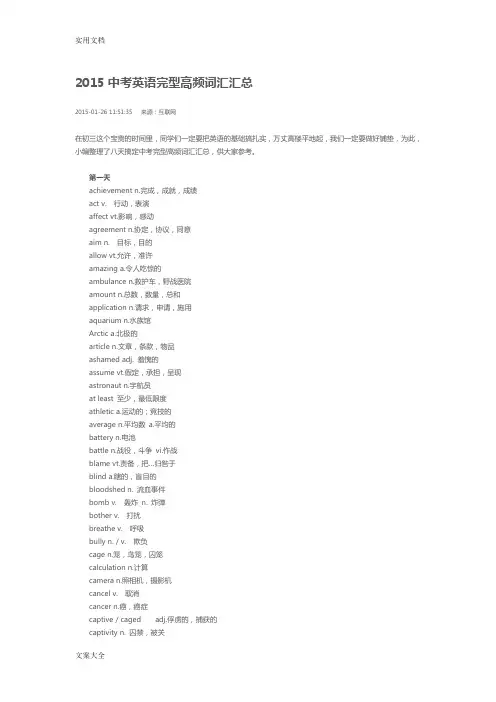
2015中考英语完型高频词汇汇总2015-01-26 11:51:35 来源:互联网在初三这个宝贵的时间里,同学们一定要把英语的基础搞扎实,万丈高楼平地起,我们一定要做好铺垫,为此,小编整理了八天搞定中考完型高频词汇汇总,供大家参考。
第一天achievement n.完成,成就,成绩act v. 行动,表演affect vt.影响,感动agreement n.协定,协议,同意aim n. 目标,目的allow vt.允许,准许amazing a.令人吃惊的ambulance n.救护车,野战医院amount n.总数,数量,总和application n.请求,申请,施用aquarium n.水族馆Arctic a.北极的article n.文章,条款,物品ashamed adj. 羞愧的assume vt.假定,承担,呈现astronaut n.宇航员at least 至少,最低限度athletic a.运动的;竞技的average n.平均数a.平均的battery n.电池battle n.战役,斗争vi.作战blame vt.责备,把…归咎于blind a.瞎的,盲目的bloodshed n. 流血事件bomb v. 轰炸n. 炸弹bother v. 打扰breathe v. 呼吸bully n. / v. 欺负cage n.笼,鸟笼,囚笼calculation n.计算camera n.照相机,摄影机cancel v. 取消cancer n.癌,癌症captive / caged adj.俘虏的,捕获的captivity n. 囚禁,被关cause n.原因,理由celebration n.庆祝,祝贺chain n.链,链条,项圈challenge n.挑战cheer v. 欢呼chest n.胸腔,胸膛,箱子claim v. 认领close adj. 亲密的comfortable a.舒适的,安慰的command vt.命令,指挥,控制common a.普通的,共同的community n.社区compare vt.比较,对照complain v. 抱怨,投诉complaint n.抱怨,控告complete v. 完成adj. 完整的connect vt.连接,联系continue vt.继续control vt.控制,克制n.控制counter n.柜台,计数器countless a.无数的courage n.勇气,胆量course n. 课程crash vi.碰撞,坠落n.碰撞creature n.生物,创造物crossing n. 十字路口cube-shaped adj. 立方体形状的culture n. 文化第二天dairy n.牛奶场,乳制品dangerous a.危险的dare vt. aux. v.敢,竟敢deaf a.聋的degree n.程度,度,学位diet n.饮食,食物direction n.方向,指导directly ad.直接地,立即disappoint v. 使……失望disastrous a.灾难性的,悲惨的discover vt.发现,暴露,显示discuss vt.讨论disorder n.混乱,骚乱distance n.距离,远处distract v. 分散注意力documentary a.有文件的;有证件的double a.两倍的,双的earth-orbiting adj. 围绕地球轨道的effect n.效果,效力elbow n.肘,肘部emotionally ad. 在情绪上encourage vt.鼓励,支持,助长energy n.活力,精力,能量enhance vt.提高,增加,夸张exactly adv. 确切地exit n.出口,退场vi.退出expect vt.预料,预期,等待experience v. 经历n.经历;经验experienced adj. 经验丰富的experiment n.实验,试验expert n. 专家explanation n.解释,说明,辩解exploration n.探索explorer n.探测者expression n.词句,表达,表情extremely ad.极其,非常fake n.假货,膺品a.假的fireworks n.[pl.]爆竹,烟花flutter v. 扑腾follow vt.跟随,结果是free v.释放freedom n.自由fridge n.电冰箱friendship n.友谊,友好第三天gadget n.小器具,小配件get-together n.(使)聚集;(使)集合giant n.巨人,巨物government n.政府gradually ad.逐渐地,逐步地grain n.谷物,谷粒,颗粒hand v. 递给handout n.分发head n. 首领,头目headphone n. 耳机height n高度high-fat adj.高脂肪的highway n.高速公路honesty n. 诚实honor v. 纪念n. 荣耀;荣誉human-powered adj. 人力的ice-covered adj. 冰封的;冰覆盖的improve vi.改善,提高include vt.包括,包含inexpensive a.廉价的injury n.损害,伤害,受伤处instruction n.命令,教学,教训intellectual n.知识分子a.智力的international a.国际的interview n.接见,会见,面谈introverted adj. (性格)内向的invite v. = attract 吸引item n. 提干,条款journey n.旅行,旅程judge v. 判断laptop n. 手提式个人电脑latest a. 最近的leading adj. 最主要的,第一的lens n. 镜头light v. 点燃location n.位置,场所lower v. 低下第四天major a.主要的,多数的n.专业manage vt.管理,控制manager n.经理marry vt.娶,嫁vi.结婚measure vt.量,测量n.测量;措施middle-aged adj. 中年的mockingbird n. 模仿鸟mop v. 拖(地板)murder n.谋杀vt.谋杀native a.本土的,本国的n.本地人naturally ad.自然地;天然地nervous a.紧张的,易激动的nervousness n. 神经过敏;紧张nomads n. 游牧部落nut n. 坚果nutritious a.有营养的obstacle n.障碍operation n.操作;经营;手术orbit n.运行轨道vt.环绕organize v. 组织ornithologist n. 鸟类学者outgoing adj. 友善的,即将离去的overacted adj. 行为夸张的partnership n 合作.patient a.耐心的n.病人peacefully ad. 和平地,和谐地peanut n.花生perfect vt.改善a.完美的perform vt.执行;演出phone n.电话vt.打电话photography n. 摄影,照相physically ad. 体格上,身体上picture v. 描绘poison n.毒药vt.毒害;投毒pollute vt.污染powder n.粉末;火药power n.力量powerful a.强有力的practice v.练习,实践prefer v.更喜欢president n.总统,校长pressure v.向…施加压力n.压力. private a.私人的,秘密的produce vt.生产;产生producer n.生产者production n.产品;产量progress n.进展,进步prompt n. 提示protect vt.保护,保卫protein n.蛋白质prove vt.证明vi.结果是psychologist n.心理学家punish v. 惩罚purpose n.目的,意图第五天radio v. 用无线电发射rainforest n. 雨林rate n.比率;速度;价格vt.评价,估价raw a.生的;未加工的reference n. 证明人refuse v. 拒绝regular a.规则的,常规的relatively ad.比较…地,相对地relaxation n.松驰;松懈relaxed a.放松的remove vt.移动;搬迁requirement n.需要,要求respond v. 回应,反应result n.成果;结果vi.结果,导致reward n.报答;报酬vt.报答;酬金roasted a.烤好的rubber n.橡皮,橡胶a.橡胶的rush v. 冲,奔,闯safety n.安全,保险sandbox n. 沙箱,沙盒satellite n.卫星satisfy vt.满足,使满意scare v. 恐吓,使……害怕= fear, frightenscientific a.科学的screen n. 触屏seed n.种(子),籽self-centereda. 自我中心的,自我本位的,利己主义的self-pitying adj.separation n.分离,分开shape n.形状vt.形成share vt.分享,共享n.份额,股份sickness n.疾病;恶心,呕吐感signal n. 信号similar a.相似的,类似的sledge n. 雪橇special a.特殊的,专门的sponsor n.发起者,赞助人vt.发起,赞助start-up n. 启动,(刚刚起步的)小公司stomach n.胃;胃口;欲望strategy n. 策略stressful a.有压力的strict a.严格的,严谨的structure n.结构;建筑物vt.建造subway n.隧道;地铁suffer v. 遭受…..痛苦suggest vt.建议;暗示,启发sunglasses n. 太阳眼镜system n.系统;制度talent n.天才,才能technology n.工艺,技术teenager n.青少年telegram n.电报temperature n.温度;体温tent n.帐篷theory n.理论,学说thumb n.大拇指traditional a.传统的treat vt.对待,处理n.款待tremble vi.发抖,哆嗦troop n.军队第六天underground a.地下的;秘密的underlined adj. 划线於下的unexpected a.意外的universal a.宇宙的;普遍的unlit adj. 未点燃的unusual a.不平常的,独特的vacuum n.真空value n.价值,价格vt.评价vehicle n.车辆victory n.胜利,战胜videophone n. 电视电话webcams n. 网络摄像机well-being a. 安宁,福利wizardry n. 巫术worldwide adj.全世界第七天turn into = change into 把……变成When it comes to …当提到……,当谈到……knock out 出局make a wish 许诺the finishing line 终点线up and down 上下地,到处,前前后后,来来往往come over 走过去stay healthy 保持健康no more than 仅仅,只是have a lot to do with 与…..有很大关系be home to 是……所在地,栖息地the rest of 其余的agree with 同意come true 实现learn from 听说mental illness 精神病little by little 逐渐地over time 随着时间的流逝volunteer group 志愿者小组from then on 从那时开始sb’s face lit up. (使)变得容光焕发或振奋depend on 依赖,依靠North Pole 北极put up = set up, build up 建立,设立,搭起belong to 属于think highly of 高度赞扬第八天in the form of 以……的形式first aid 急救check for a pulse 号脉heart attack 心脏病fall into place 依序排列,依序出现make one’s way through 穿过,走过take action 采取行动junk food 垃圾食品bar codes 条形码let down 使……失望slow down 慢下来,停下脚步lottery ticket 彩票book the flight 订机票rush through 快速通过,赶紧做advanced degree 高学历come up with 提出、想出(看法、观点)。
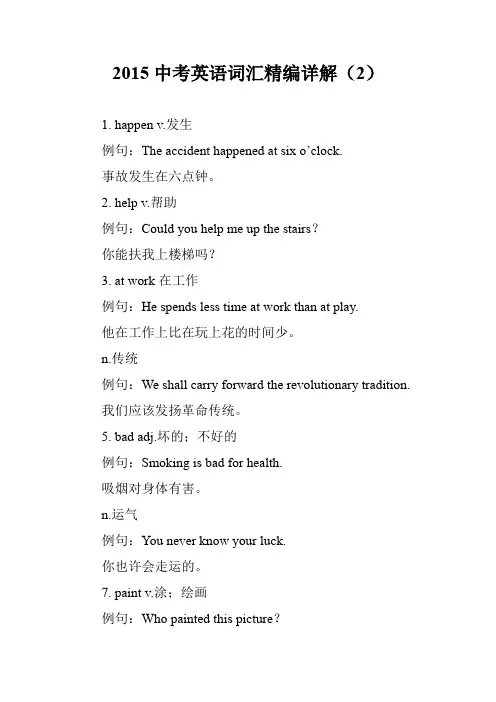
2015中考英语词汇精编详解(2)1. happen v.发生例句:The accident happened at six o’clock.事故发生在六点钟。
2. help v.帮助例句:Could you help me up the stairs?你能扶我上楼梯吗?3. at work在工作例句:He spends less time at work than at play.他在工作上比在玩上花的时间少。
n.传统例句:We shall carry forward the revolutionary tradition. 我们应该发扬革命传统。
5. bad adj.坏的;不好的例句:Smoking is bad for health.吸烟对身体有害。
n.运气例句:You never know your luck.你也许会走运的。
7. paint v.涂;绘画例句:Who painted this picture?这幅画是谁画的?8. mean v.意思是;意味例句:I don‘t understand what the word means.我不懂这个词是什么意思。
9. decorate v.装饰例句:We decorated the house for Christmas.我们为圣诞节装饰房子。
n.装饰,装饰品例句:She put some decorations on the Christmas tree. 她在圣诞树上放了一些装饰品。
11. paper cut剪纸例句:There are paper cuts on the doors and windows. 门窗上贴上了剪纸。
pron.每个人;每一个例句:Everyone should obey the government ordinance. 每个人都必须遵守政府法令。
n.理发例句:You ought to have a haircut.你该去剪发了。
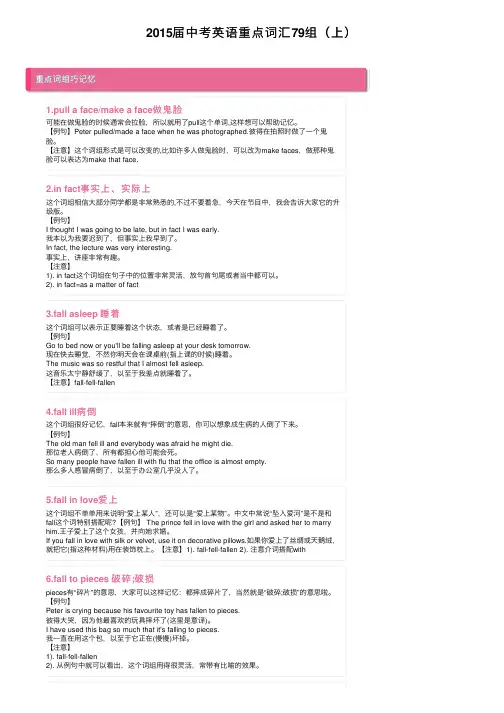
2015届中考英语重点词汇79组(上)重点词组巧记忆1.pull a face/make a face做⿁脸可能在做⿁脸的时候通常会拉脸,所以就⽤了pull这个单词,这样想可以帮助记忆。
【例句】Peter pulled/made a face when he was photographed.彼得在拍照时做了⼀个⿁脸。
【注意】这个词组形式是可以改变的,⽐如许多⼈做⿁脸时,可以改为make faces,做那种⿁脸可以表达为make that face.2.in fact事实上、实际上这个词组相信⼤部分同学都是⾮常熟悉的,不过不要着急,今天在节⽬中,我会告诉⼤家它的升级版。
【例句】I thought I was going to be late, but in fact I was early.我本以为我要迟到了,但事实上我早到了。
In fact, the lecture was very interesting.事实上,讲座⾮常有趣。
【注意】1). in fact这个词组在句⼦中的位置⾮常灵活,放句⾸句尾或者当中都可以。
2). in fact=as a matter of fact3.fall asleep 睡着这个词组可以表⽰正要睡着这个状态,或者是已经睡着了。
【例句】Go to bed now or you'll be falling asleep at your desk tomorrow.现在快去睡觉,不然你明天会在课桌前(指上课的时候)睡着。
The music was so restful that I almost fell asleep.这⾳乐太宁静舒缓了,以⾄于我差点就睡着了。
【注意】fall-fell-fallen4.fall ill病倒这个词组很好记忆,fall本来就有“摔倒”的意思,你可以想象成⽣病的⼈倒了下来。
【例句】The old man fell ill and everybody was afraid he might die.那位⽼⼈病倒了,所有都担⼼他可能会死。
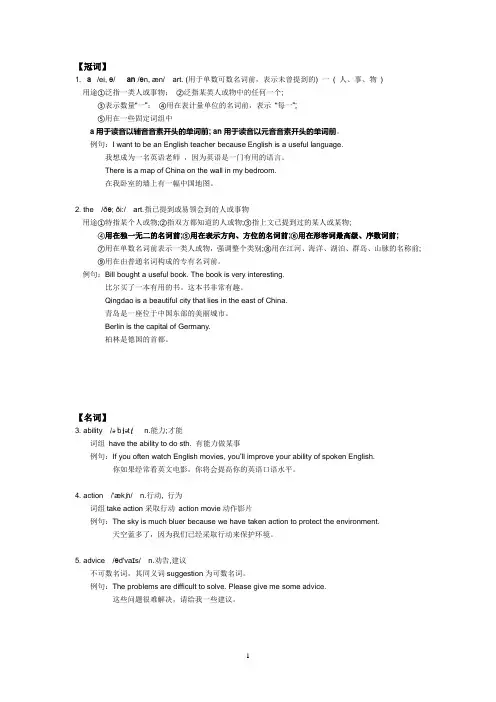
【冠词】1. a /ei, ə/ an /ən, æn/art. (用于单数可数名词前,表示未曾提到的) 一( 人、事、物)用途①泛指一类人或事物;②泛指某类人或物中的任何一个;③表示数量“一”;④用在表计量单位的名词前,表示“每一”;⑤用在一些固定词组中a用于读音以辅音音素开头的单词前; an用于读音以元音音素开头的单词前。
例句:I want to be an English teacher because English is a useful language.我想成为一名英语老师,因为英语是一门有用的语言。
There is a map of China on the wall in my bedroom.在我卧室的墙上有一幅中国地图。
2. the /ðə; ði:/ art.指已提到或易领会到的人或事物用途①特指某个人或物;②指双方都知道的人或物;③指上文已提到过的某人或某物;④用在独一无二的名词前;⑤用在表示方向、方位的名词前;⑥用在形容词最高级、序数词前;⑦用在单数名词前表示一类人或物,强调整个类别;⑧用在江河、海洋、湖泊、群岛、山脉的名称前;⑨用在由普通名词构成的专有名词前。
例句:Bill bought a useful book. The book is very interesting.比尔买了一本有用的书。
这本书非常有趣。
Qingdao is a beautiful city that lies in the east of China.青岛是一座位于中国东部的美丽城市。
Berlin is the capital of Germany.柏林是德国的首都。
【名词】3. ability /əˈbɪlətɪ/ n.能力;才能词组have the ability to do sth. 有能力做某事例句:If you often watch English movies, you’ll improve your ability of spoken English.你如果经常看英文电影,你将会提高你的英语口语水平。
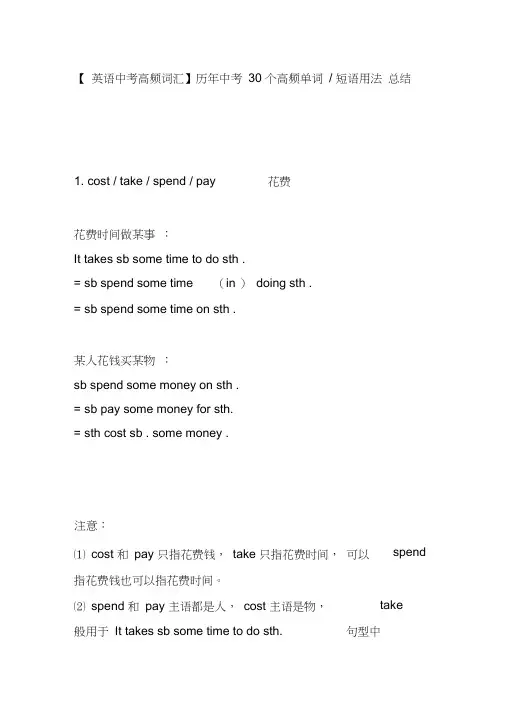
【英语中考高频词汇】历年中考30 个高频单词/ 短语用法总结1. cost / take / spend / pay 花费花费时间做某事:It takes sb some time to do sth .= sb spend some time (in )doing sth .= sb spend some time on sth .某人花钱买某物:sb spend some money on sth .= sb pay some money for sth.= sth cost sb . some money .注意:⑴ cost 和pay 只指花费钱,take 只指花费时间,可以指花费钱也可以指花费时间。
⑵ spend 和pay 主语都是人,cost 主语是物,spend take般用于It takes sb some time to do sth. 句型中2. thanks for 为⋯... 而感谢Thanks for inviting me to your birthday party . 你邀请我来你的生日聚会。
thanks to 多亏/ 由于Thanks to your help. I got good grades . 我才取得好成绩。
3. 多么⋯...what 名词;how 形容词/ 副词谢谢幸亏你的帮助,2. thanks for 为⋯... 而感谢What bad weather !多么糟糕的天气啊!How hard he works! 他工作多么努力啊!! 多么新鲜的蔬菜啊!! 它是一只多么可爱的猴子啊! 4 . 因为 .... ;由于because (连词) 从句because of (介词短语) 名词(短语)I didn ' t go to school because I had a headache. 因为我头疼,所以我没去上学。
He was late for class because of the bad weather . 由于糟糕的天气,他上课迟到了。
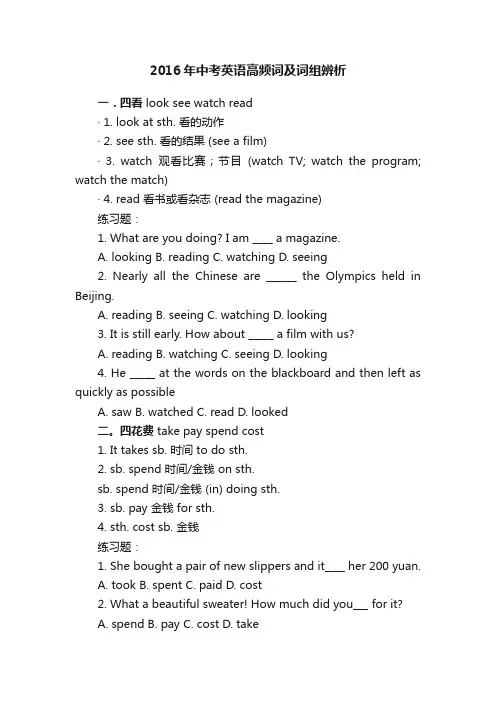
2016年中考英语高频词及词组辨析一.四看 look see watch read· 1. look at sth. 看的动作· 2. see sth. 看的结果 (see a film)· 3. watch观看比赛;节目(watch TV; watch the program; watch the match)· 4. read 看书或看杂志 (read the magazine)练习题:1. What are you doing? I am ____ a magazine.A. lookingB. readingC. watchingD. seeing2. Nearly all the Chinese are ______ the Olympics held in Beijing.A. readingB. seeingC. watchingD. looking3. It is still early. How about _____ a film with us?A. readingB. watchingC. seeingD. looking4. He _____ at the words on the blackboard and then left as quickly as possibleA. sawB. watchedC. readD. looked二。
四花费 take pay spend cost1. It takes sb. 时间 to do sth.2. sb. spend 时间/金钱 on sth.sb. spend 时间/金钱 (in) doing sth.3. sb. pay 金钱 for sth.4. sth. cost sb. 金钱练习题:1. She bought a pair of new slippers and it____ her 200 yuan.A. tookB. spentC. paidD. cost2. What a beautiful sweater! How much did you___ for it?A. spendB. payC. costD. take3. How long did it ______ you to fly to Hong Kong?A. costB. spendC. takeD. pay4. There was so much homework that the boy____ two hours finishing it.A. costB. spentC. tookD.paid三.穿过 over , through,across的用法区别over ―越过、翻越过去‖The bird flew over the river. 鸟从河水表面飞过。
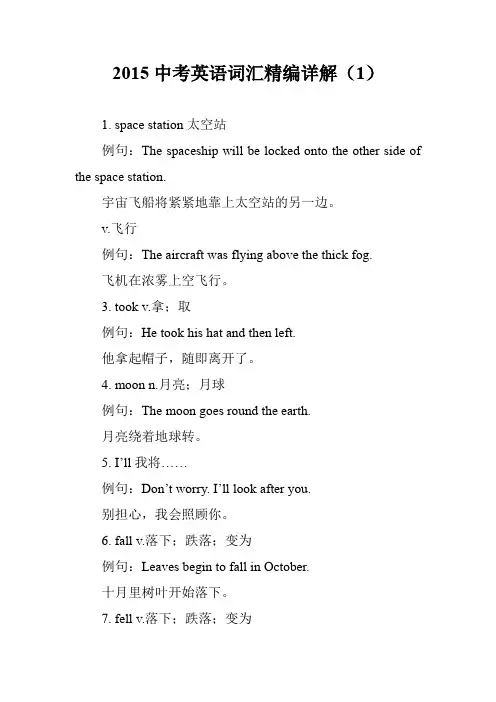
2015中考英语词汇精编详解(1)1. space station太空站例句:The spaceship will be locked onto the other side of the space station.宇宙飞船将紧紧地靠上太空站的另一边。
v.飞行例句:The aircraft was flying above the thick fog.飞机在浓雾上空飞行。
3. took v.拿;取例句:He took his hat and then left.他拿起帽子,随即离开了。
4. moon n.月亮;月球例句:The moon goes round the earth.月亮绕着地球转。
5. I’ll我将……例句:Don’t worry. I’ll look after you.别担心,我会照顾你。
6. fall v.落下;跌落;变为例句:Leaves begin to fall in October.十月里树叶开始落下。
7. fell v.落下;跌落;变为例句:The dishes fell to the floor.碟子跌落到地板上。
8. fall in love with爱上例句:The young girl falls in love with the boy next door quietly.小女孩默默地爱上了隔壁的男孩子。
9. alone adv.单独地;孤独地例句:For years Mary lived alone in New York.玛丽孤身一人在纽约生活了好几年。
10. pet n.宠物例句:My daughter keeps a rabbit as pet.我的女儿养了一只兔子当做宠物。
11. parrot n.鹦鹉例句:The boy had a parrot on his right shoulder.男孩把一只鹦鹉放在右肩上。
12. probably adv.大概,或许例句:I’ll be probably free then.那时我大概就有空了。
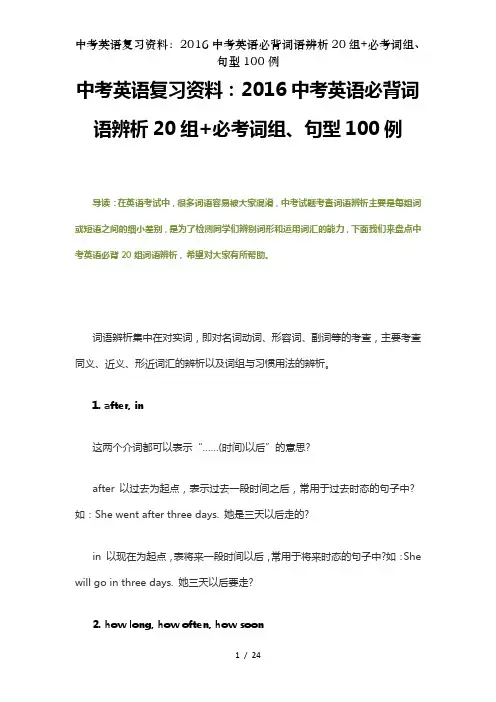
中考英语复习资料:2016中考英语必背词语辨析20组+必考词组、句型100例导读:在英语考试中,很多词语容易被大家混淆,中考试题考查词语辨析主要是每组词或短语之间的细小差别,是为了检测同学们辨别词形和运用词汇的能力,下面我们来盘点中考英语必背20组词语辨析,希望对大家有所帮助。
词语辨析集中在对实词,即对名词动词、形容词、副词等的考查,主要考查同义、近义、形近词汇的辨析以及词组与习惯用法的辨析。
1. after, in这两个介词都可以表示“……(时间)以后”的意思?after 以过去为起点,表示过去一段时间之后,常用于过去时态的句子中?如:She went after three days. 她是三天以后走的?in 以现在为起点,表将来一段时间以后,常用于将来时态的句子中?如:She will go in three days. 她三天以后要走?2. how long, how often, how soonhow long指多长时间,主要用来对一段时间(如three days, four weeks 等)提问?如:How long ago was it? 这是多久前的事了?how often指每隔多久,主要用来对频率副词或状语(如once a week等)提问?如:—How often does he come here? —Once a month. 他(每隔)多久来一次?每月一次?how soon指再过多久,主要用来对表示将来的一段时间(in an hour, in two weeks 等)提问?如:How soon can you come? 你多快能赶来?3. few, a few, little, a little, several, somefew 和little的意思是否定的,表示“很少”或“几乎没有”;而a few和a little的意思是肯定的,表示“有一些,有一点儿”?few 和a few修饰可数名词;little 和a little 修饰不可数名词?several用于修饰可数名词,语意比a few和some更肯定,含有“好几个”的意思?some可修饰可数名词,也可修饰不可数名词,从数量上说,它有时相当于a few 或a little,有时指更多一些的数量?4. the other, anotherthe other 指两个人或事物中的“另一个”,表示特指?如:We stood on one side of the road and they stood on the other. 我们站在街这边,他们站在那边?another着重于不定数目中的“另外一个”,表示泛指,所以常用来指至少三个中的一个?如:She has taken another of my books. 她已经拿了我的另外一本书?5. spend, take, cost, payspend的宾语通常是时间?金钱?在主动语态中,句子的主语必须是人,而且后面不能用动词不定式做它的宾语?如:She spent the whole evening in reading. 她把整个晚上用来读书?take常常用来指“花费”时间,句子的主语通常是表示事物的词语?如:How long will this job take you?你做这项工作要花多长时间?cost 指花费时间?金钱或力气等,只能用表示事物的词做主语,并且不能用于被动语态?如:How much does the jacket cost?这件夹克多少钱?pay 主要指主语(某人)买某物(或为某事)付多少钱(给某人)?如:I pay for my rooms by month. 我按月支付租金?6. speak, say, talk, tell这四个动词都有“说”的意思?speak的意思是“讲话;演讲”,着重指说话的动作,指开口说或连续不断地说,多用作不及物动词;用作及物动词时,其宾语是语言名称?如:He can speak Japanese. 他会说日语?say的意思是“说;讲”,一般用作及物动词,着重指说话的内容?它的宾语可以是名词?代词或直接引语等?如:She says, “Don’t draw on the wall!”她说:“别在墙上画画!”talk的意思是“说;讲;谈话”,与speak意义比较接近,但不如speak正式,着重强调两人之间的相互谈话,也可指单方面的谈话?如:She is talking with John in English。
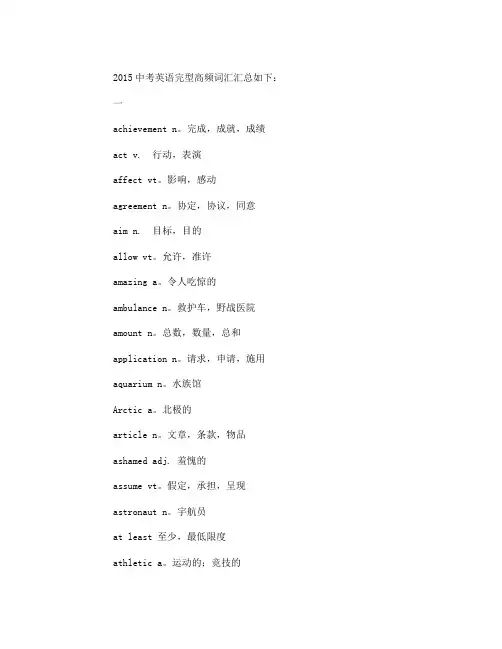
2015中考英语完型高频词汇汇总如下:一achievement n。
完成,成就,成绩act v. 行动,表演affect vt。
影响,感动agreement n。
协定,协议,同意aim n. 目标,目的allow vt。
允许,准许amazing a。
令人吃惊的ambulance n。
救护车,野战医院amount n。
总数,数量,总和application n。
请求,申请,施用aquarium n。
水族馆Arctic a。
北极的article n。
文章,条款,物品ashamed adj. 羞愧的assume vt。
假定,承担,呈现astronaut n。
宇航员at least 至少,最低限度athletic a。
运动的;竞技的average n。
平均数 a。
平均的battery n。
电池battle n。
战役,斗争 vi。
作战blame vt。
责备,把…归咎于blind a。
瞎的,盲目的bloodshed n. 流血事件bomb v. 轰炸 n. 炸弹bother v. 打扰breathe v. 呼吸bully n. / v. 欺负cage n。
笼,鸟笼,囚笼calculation n。
计算camera n。
照相机,摄影机cancel v. 取消cancer n。
癌,癌症captive / caged adj。
俘虏的,捕获的captivity n. 囚禁,被关cause n。
原因,理由celebration n。
庆祝,祝贺chain n。
链,链条,项圈challenge n。
挑战cheer v. 欢呼chest n。
胸腔,胸膛,箱子claim v. 认领close adj. 亲密的comfortable a。
舒适的,安慰的command vt。
命令,指挥,控制common a。
普通的,共同的community n。
社区compare vt。
比较,对照complain v. 抱怨,投诉complaint n。
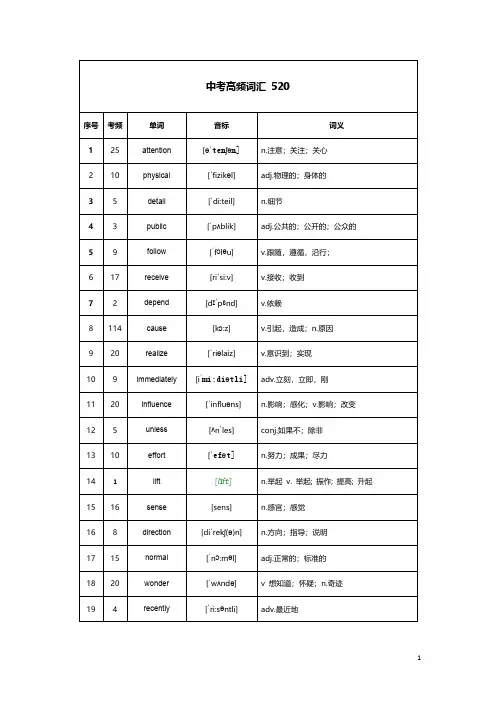
13413raise[reiz]v.提高;抚养;筹集13513able[ˈeibəl]adj.能够的,有能力的序号考频单词音标词义13613afraid[əˈfreid]adj.害怕的13713agree[əˈgri:]v.同意13813along[əˈlɔŋ]adv.向前地;prep.沿着13913anything[ˈeniθiŋ]pron.任何事14013back[bæk]adv.回原处;n.背;后面14113blow[bləu]v.吹;搞砸(口);n.打击14312allow[əˈlau]v.允许;给予;认可14412product[ˈprɔdʌkt]n.产品14512carry[ˈkæri]v.搬运;携带14612native[ˈneitiv]adj.出生地的n.本地(国)人14712technology[tekˈnɔlədʒi]n.科技;工艺,技术14812although[ɔ:lˈðəu]conj.虽然,然而,尽管14912land[lænd]v.着陆;n.土地15012interesting[ˈintristiŋ]adj.有趣的;引人入胜的序号考频单词音标词义15112natural[ˈnætʃərəl]adj.自然的;天然的15212news[nju:z]n.新闻15312surprise[səˈpraiz]n.惊奇;v.使感到...意外15412toward(s)[təˈwɔ:d(z)]prep.朝17611wide[waid]adj.宽的;广泛的17711inside[inˈsaid]prep.在……内部17811invention[inˈvenʃən]n.发明;发明物17911step[step]v.行走;踏上;n.脚步;步骤18011sudden[ˈsʌdn]adj.突然的;意外的序号考频单词音标词义18111though[ðəu]conj.虽然;但是18211especially[iˈspeʃəli]adv.尤其;格外18311check[tʃek]v.检查;核对;n.支票18411purpose[ˈpə:pəs]n.目的18511rather[ˈrɑ:ðə]adv.相当;宁可18611among[əˈmʌŋ]prep.在…中间(之中)18711healthy[ˈhelθi]adj.健康的18810relaxation[ri:lækˈseiʃən]n.放松18910relaxed[riˈlæks]adj.放松的19010lead[li:d]v.带路;领导;导致;通向n.领导19210phone[fəun]v.打电话给...;n.电话;耳机19310protect[prəˈtekt]v.保护,防护;为...保险19410energy[ˈenədʒi]n.能量;精力19510medical[ˈmedikəl]adj.医学的序号考频单词音标词义19610camp[kæmp]v.野营;n.营地19710specially[ˈspeʃəli]adv.专门地;特别地19810unusual[ʌnˈju:ʒuəl]adj.不寻常的;非常的;罕见的20010require[riˈkwaiə]v.要求;命令20110instead[inˈsted]adv.代替;相反20210lucky[ˈlʌki]adj.幸运的;吉祥的20310market[ˈmɑ:kit]n.市场20410mountain[ˈmauntin]n.山20510busy[ˈbizi]adj.繁忙的20610drop[drɔp]v.跌落;降低;n.下降;滴[pl] 20810energetic[ˌenəˈdʒetik] a.精力充沛的,充满活力的20910excuse[ikˈskju:z]v.原谅;n.借口21010college[ˈkɔlidʒ]n.学院;大学序号考频单词音标词义21110period[ˈpiəriəd]n.节;时代21210personal[ˈpə:sənəl]adj.个人的;私人的21310trip[trip]n.旅行21410prize[praiz]n.奖赏;奖金21510alone[əˈləun] a.单独;独自21610appear[əˈpiə]v.出现21710field[fi:ld]n.领域;田野21810final[ˈfainəl]adj.最后的21910form[fɔ:m]v.形成;n.表格;方式22010hit[hit]v.打,击中2229course[kɔ:s]n.过程;进程2239discover[disˈkʌvə]v.发现;发觉2249addition[əˈdiʃən]n.加,加法2259avoid[əˈvɔid]v.避开;使无效;避免;撤销序号考频单词音标词义2269relation[riˈleiʃən]n.关系;家属2279service[ˈsə:vis]n.业务;公务2299manage[ˈmænidʒ]v.设法;管理;处理2309mention[ˈmenʃən]v.提及;说到;n.提及;说到2319strange[streindʒ]adj.奇怪的;古怪的2329subject[ˈsʌbdʒikt]v.使服从;n.题目;科目2339weigh[wei]v.称重量2349cost[kɔst]v.花费n.费用;成本2359pleasant[ˈplezənt]adj.令人愉快的;亲切的2369afford[əˈfɔ:d]v.提供;负担得起2379finish[ˈfiniʃ]v.完成结束n.结束2389fit[fit]v.适宜;适合adj.健康的;合适的2399suffer[ˈsʌfə]v.遭受,忍受2409actually[ˈæktʃuəli]adv.事实上;实际上序号考频单词音标词义2419cover[ˈkʌvə]vt.(掩)盖;n.盖子;封面2429harm[hɑ:m]n.损害2439facial[ˈfeiʃəl]n.面部的2448honest[ˈɔnist]adj.诚实的;坦率的2478international[ˌintəˈnæʃənəl]n.国际的;世界性的2488join[dʒɔin]v.参加;结合2498lose[lu:z]v.失去;失败;遗失2508object[ˈɔbdʒikt]v.反对;n.目的;目标2518spread[spred]v.传播;延伸2528throw[θrəu]v.投掷;丢2538difficulty[ˈdifikəlti]n.困难;难事2548whole[həul]adj.全部的;整个序号考频单词音标词义2568brave[breiv]adj.勇敢的2578communication[kəˌmju:niˈkeiʃən]n.通信;传播;通话2588conversation[ˌkɔnvəˈseiʃən]n.谈话;会话2598proper[ˈprɔpə]adj.合适的;适当的2608advice[ədˈvais]n.建议2618already[ɔ:lˈredi]adv.已经2628fill[fil]v.装满;充满2638affect[əˈfekt]v.影响;感染2658regular[ˈregjulə]adj.定期的,有规律的2668safety[ˈseifti]n.安全2678prefer[priˈfə:]v.更喜欢2688creative[kri:ˈeitiv]adj.创新的2698reduce[riˈdju:s]v.减少2708quite[kwait]adv.相当,很序号考频单词音标词义2718friendly[ˈfrendli]adj.友好的,互助的,亲切的2728government[ˈgʌvənmənt]n.政府,内阁2738move[mu:v]v.搬;动摇;感动;n.移动,搬家2748lonely[ˈləunli]adj.孤独的,寂寞的2758national[ˈnæʃən(ə)l]adj.国际的2768matter[ˈmeitə]v.要紧;n.事情2778cultural[ˈkʌltʃərəl]adj.文化的2788fear[fiə]n.害怕,恐惧2798problem[ˈprɔbləm]n.问题2808catch[kætʃ]v.抓2818responsible[riˈspɔnsəbəl]adj.承担责任的;有责任感的2828necessary[ˈnesisəri] a.必要的;必然的;n.必需品2838remind[riˈmaind]v.提醒,使想起2848refer[riˈfə:]v.提到;涉及2858record[ˈrekɔ:d]v.记录;n.记录;唱片序号考频单词音标词义2868return[riˈtə:n]v.归还;报答2878risk[risk]v.冒险;n.风险2888smart[smɑ:t]adj.聪明伶俐的;漂亮的2897opposite[ˈɔpəzit]adj.相对的;prep.在...对面2907instruct[inˈstrʌkt]v.教导;吩咐;委托2917nature[ˈneitʃə]n.自然;本性;大自然2927perhaps[pəˈhæps]adv.也许,大概2937private[ˈpraivit]n.士兵;私下;adj.私人的2947emotion[iˈməuʃən]n.情感,情绪2957condition[kənˈdiʃən]n.情况,状态2967achieve[əˈtʃi:v]v.取得2977positive[ˈpɔzətiv]adj.积极的2987introduction[ˌintrəˈdʌkʃən]n.介绍2997success[səkˈses]n.成功3007support[səˈpɔ:t]v.支撑,支持;n.支撑;支持序号考频单词音标词义3017send[send]v.发送;发射3027shout[ʃaut]v.呼喊;大喊;n.呼喊;大喊3037memory[ˈmeməri]n.记忆3047north[nɔ:θ]adj.北方的3057society[səˈsaiəti]n.社会3067temperature[ˈtemp(ə)ritʃə]n.温度;体温3077solution[səˈlu:ʃən]n.解决方法3087deep[di:p]adj.深的;adv.深入地3097useful[ˈju:sfəl]adj.有用的;有益的3107visit[ˈvizit]v.参观;访问;n.参观;访问3117depress[diˈpres]v.使沮丧;使不景气3127building[ˈbildiŋ]n.建筑物;大楼3137chest[tʃest]n.胸3147choice[tʃɔis]n.选择3157patient[ˈpeiʃənt]adj.耐心的;忍耐的;n.病人序号考频单词音标词义3167thread[θred]n.线索3177perfect[ˈpə:fikt]adj.完美的;极好的3187perform[pəˈfɔ:m]v.履行;表演3197wise[waiz]adj.聪明的3207accept[əkˈsept]v.接受;承担;同意3217yet[jet]adv.还;已经;conj.但是;然后3227bear[bɛə]v.忍受;n.熊3237hall[hɔ:l]n.门厅3246stressful[ˈstresfəl]adj.紧张的,有压力的3256completely[kəmˈpli:tli]adv.完全地,彻底3266connection[kəˈnekʃən]n.连接;关系;连接件3286humor[ˈhju:mə]n.幽默3296protection[prəˈtekʃən]n.保护3306prepare[priˈpɛə]v.准备序号考频单词音标词义3326separate[ˈsepəreit]adj.分开的v.分开3336design[diˈzain]v.设计;n.设计3346focus[ˈfəukəs]v.聚集,集中3356strength[ˈstreŋθ]n.力气;效力;实力3366sick[sik]adj.病人的;恶心的3376pull[pul]v.拉,拖3386pleasure[ˈpleʒə]v.使高兴;n.快乐3396almost[ˈɔ:lməust]adv.差不多,几乎3406level[ˈlevəl]n.级别;标准;水平3416mark[mɑ:k]v.标明;打分;n.痕迹;记号3426hide[haid]v.隐藏3436moment[ˈməumənt]n.片刻;瞬间3446nervous[ˈnə:vəs]adj.紧张不安的3456space[speis]n.空间;太空序号考频单词音标词义3466suggestion[səˈdʒestʃən]n.建议;提议3476task[tɑ:sk]n.任务3486lack[læk]v.缺乏,不足;n.缺乏,不足3496terrible[ˈterəb(ə)l]adj.可怕的;恐怖的3506discover[disˈkʌvə]v.发现;暴露3516trouble[ˈtrʌbəl]v.烦恼;n.麻烦3526celebrate[ˈselibreit]v.庆祝3536bright[brait]adj.明亮的;聪明的;adv.欢快地3546break[breik]v.打破;弄坏;n.休息3556address[əˈdres]n.地址3566future[ˈfju:tʃə]n.未来,将来3575amount[əˈmaunt]v.总计;合计;n.数(量)3585continue[kənˈtinju:]v.继续,延续3595expect[ikˈspekt]v.期望;指望3605skill[ski:l]n.技能,技巧序号考频单词音标词义3615disorder[disˈɔ:də]v.使失调;n.混乱3625event[iˈvent]n.事件3635rate[reit]n.比率3655sharp[ʃɑ:p]adj.锋利的3675crazy[ˈkreizi]adj.疯狂的3685basic[ˈbeisik]adj.基础的;基本的3695damage[ˈdæmidʒ]v.损坏3705seldom[ˈseldəm]adv.很少3715include[inˈklu:d]v.包括,包含3725treat[tri:t]v.治疗;对待;视为;n.请客;款待3735disappoint[ˌdisəˈpɔint]v.使失望3745attraction[əˈtrækʃən]n.吸引力序号考频单词音标词义3765refuse[riˈfju:z]v.拒绝3775sentence[ˈsentəns]n.句子3785shut[ʃʌt]v.关闭3795competition[ˌkɔmpəˈtiʃən]n.竞争;比赛3815hungry[ˈhʌŋgri]adj.饥饿的3825touch[tʌtʃ]v.接触;n.接触3835build[bild]v.建造;构成3845hurt[hə:t]v.使受伤;adj.受伤的3855habit[ˈhæbit]n.习惯3865taste[teist]v.品尝3875trade[treid]v.贸易,交易;n.贸易,交易3885alive[əˈlaiv]adj.活的;活泼的3895bill[bil]n.账单3905invite[inˈvait]v.邀请序号考频单词音标词义3915text[tekst]n.文本;课本3925wait[weit]v.等待3935death[deθ]n.死亡3945bank[bæŋk]n.银行;岸3955key[ki:]n.关键;钥匙;答案;adj.关键的3965heat[hi:t]v.加热;n.热,炎热3974requirement[riˈkwaiəmənt]n.要求3984respond[riˈspɔnd]v.回答;n.回复3994suggest[səˈdʒest]v.提议,建议,暗示4004expert[ˈekspə:t]n.专家4024character[ˈkæriktə]n.性格,品质;角色4034wave[weiv]v.挥手;n.浪花4044hurriedly[ˈhʌridli]adv.匆忙地4054impossible[imˈpɔsəbəl]adj.不可能的序号考频单词音标词义4064interest[ˈintrist]v.使...感兴趣;n.兴趣4074tend[tend]v.趋势4084rush[rʌʃ]v.冲进;n.冲进4094single[ˈsiŋgəl]adj.单一的4104insist[inˈsist]v.坚持4114neither[ˈnaiðə]adj.两者都不4124calm[kɑ:m]v.使平静;adj.镇定的,平静的4134scientific[ˌsaiənˈtifik]adj.科学的4154pale[peil]adj.苍白的4164digital[ˈdidʒitl]adj.数字的4174feed[fi:d]v.喂养4184pressure[ˈpreʃə]v.迫使,说服;n.压(力),压强4194usual[ˈju:ʒuəl]adj.通常的4204criticize[ˈkritisaiz]v.批评;挑剔序号考频单词音标词义4214instruction[inˈstrʌkʃən]n.说明,解释;辩解4224steal[sti:l]v.偷窃4234powerful[ˈpauəfəl]adj.力量的4244role[rəul]n.角色;作用4254study[ˈstʌdi]v.学习;研究;端详;n.书房4264general[ˈdʒenərəl]adj.普遍的n.将军4274pick[pik]v.挑选,采摘;选择4284ready[ˈredi]adj.准备好的4303agreement[əˈgri:mənt]n.协议;同意;一致4313degree[diˈgri:]n.程度;等级4323reply[riˈplai]v.回应;n.回应4333material[məˈtiəriəl]adj.物质的;n.材料4343liquid[ˈlikwid]adj.液体的4353injury[ˈindʒəri]n.受伤,伤害序号考频单词音标词义4363hunt[hʌnt]v.寻找,追捕4373familiar[fəˈmiliə]adj.熟悉的4603stick[stik]v.粘贴;n.棍4613fair[fɛə]adj.公平的;相当的4623trust[trʌst]v.相信;信赖4633plenty[ˈplenti]n.充足;大量4643advise[ədˈvaiz]v.建议4653besides[biˈsaidz]prep.除...外;adv.此外;而且序号考频单词音标词义4663beyond[bɪ'jɒnd]prep.超过;在...另一边4673forget[fə'ɡet]v.忘记4682rubber[ˈrʌbɚ]n.橡胶;橡皮4692length[leŋθ]n.长度4702legal[ˈliɡəl]adj.合法的4712daily['deɪlɪ]adj.日常的;adv.每日;n.日报4722remain[rɪ'meɪn]v.仍然是;留下;剩余;n.剩余物4732compare[kəm'peə(r)]v.比较;把…比作;相比4742hurry['hʌrɪ]v.仓促;催促;迅速移动;n.匆忙4752curious[ˈkjʊriəs]adj.好奇的;古怪的;爱挑剔的4772regret[rɪˈɡrɛt]v.后悔4782communicate[kəˈmjunɪˌket]v.交流4792arrive[əˈraɪv]v.到达4802forgive[fə'ɡɪv]v.原谅序号考频单词音标词义4812specific[spɪˈsɪfɪk]adj.明确的,具体的;n.细节,特性4822silence[ˈsaɪləns]n.沉默,寂静4832measure[ˈmeʒə(r)]v.估量;n.测量,程度4842peaceful[ˈpisfəl]adj.和平的4852physically[ˈfɪzɪkəlɪ]adv.按照自然规律地;实际上;身体上4862president[ˈprezɪdənt]n.总统,董事长,总裁4872unique[juˈnik]adj.仅有的,独一无二的4882square[skweə(r)]n.广场;adj.平方的,正方形的4892recite[rɪˈsaɪt]v.背诵,朗诵4902score[skɔ:(r)]v.得分;n.分数4922translate[træns'leɪt]v.翻译4932position[pəˈzɪʃən]n.位置;地位;立场;职位4942promise['prɒmɪs]v.答应,允诺4952progress['prəʊɡres]n.进展,进步序号考频单词音标词义4962abroad[əˈbrɔ:d]adv.在国外4972production[prəˈdʌkʃn]n.生产;制作4982aim[eɪm]v.瞄准;n.目标4992tear[teə(r)]v.撕开;n.眼泪5002strict[strɪkt]adj.严格的;严谨的5012amazing[ə'meɪzɪŋ]v.使吃惊;adj.令人惊异的5022achievement[əˈtʃivmənt]n.成就;完成;达到5032camera['kæmərə]n.摄像机;摄影机5042celebration[ˌselɪˈbreɪʃn]n.庆典;庆祝会5062explanation[ˌekspləˈneɪʃn]n.说明,解释;辩解5072speed[spid]n.速度5082tourist[ˈtʊrɪst]n.游客5092apply[əˈplaɪ]v.申请;应用序号考频单词音标词义5112ordinary[ˈɔrdnˌɛri]adj.平凡的5122worldwide[ˈwɜ:ldwaɪd]adj.全世界的5132above[əˈbʌv]prep.在…上面5142case[keɪs]n.事例;情况;案件;盒;手提箱5152pity[ˈpɪti]n.可怜5162failure['feɪljər]n.失败;不足;失败者5172organize[ˈɔː(r)ɡənaɪz]v.组织5182print[prɪnt]v.印刷;出版;发行;n.印迹;印刷物5192repair[rɪˈpɛr]v.修理;n.修理5202listen['lɪsn]v.听。
12345678(已掌握考试大纲词汇词词√ v.cut(cut, cut)切,剪,削, n.dad (daddy)爸爸,爹口 dailya.每日的;日常ad.每n.日 dancen.&vi.跳 dangern.危 a.dangerous 危险darev.&aux.v 敢;敢 dark a.黑暗;暗处;日黑暗的;暗淡的;深色 n.date 日期;约 n.daughter 女 dayn.日;白;a.dead 死的;无生命 a.deaf 聋 dealv.量,数额;交 deara.亲爱 deathn. n.December 十二 v.decide 决定;下决 n.decision 决定;决 deepa.;深 ad.深;深degreen.程度;度数;学 deliciousa.美味的,可口 dentistn.牙科医 dependvi.依靠;依赖;指望;取决 vt.describe 描写,叙 deskn.书桌,写字 developv.发育;并发嘶发达发展 )照冲vt.n.development 发展;发达;发育;开 dialoguen.对 n.diary 日记;日记 n.dictionary 词典,字 die v.n.difference 不 differenta.不同的,有差异 difficulta.难的;艰难的;不易相处 difficultyn.困难;费 dig(dug, dug)v.;洞、沟 dinnern.正餐,宴 directa.直接的;直达的;直截了当vt.;导演(指挥;指导;监督;管理;指挥(演奏影 n.direction 方向;方位 9101112131415161718192021222324252627282930313233343536373839高频词组?之前在有一点,一会儿……ahead of a bit (of)总的来说,总计a few 一些,少量all in allall kinds of a great deal 大量,许多各种各样的all over 到处,遍及,结束a good/great many 大量,许多行了,好吧,a kind of 一种,一类(病)好了all rightall the best a little 一点,少许一切顺利,万事如意负责对answer for ……a lot of 许多,大量除去,除了一些,许多a number of apart froma pair of 一双,一副到达某地arrive at (in) a place事实上,其实as a matter of fact a piece of 一块,一张,一根,一片(作为)结果above all 首先,首要as a result根据,按照according to as...as 像,如同就……add up to 合计达……as soon as 一……尽;……after all 毕竟,终究范围)as far as (表示程度,就……as if 好像,仿佛课后after class 只要反复地,再三地again and again as long as同意做某事agree to do sth. as though 好像,仿佛同意某人的看法agree with sb. as usual 通常,平常地40as well 也,还有come to 共计,达到come true 变为现实,成为事实as well as 除……之外(也)come up 上来,上升,抬头belong to 属于come up with be proud of 骄傲,自豪追上,赶上;想出(主意);找出(答案)be strict with 对……严格要求compare to 与……相比……both...and 两个都,既又……compare with 与……相比break away from 脱离……congratulate...on 祝贺……break down 损坏; (把化合物等) 分解,(汽connect to 连接,相连车)抛锚connect with 与……相连break in 闯入,强行进入,插嘴,打断cut down 砍倒break off 打断; 折断cut off 切断(战争、火灾等)突然发生,爆break outcut up 发齐根割掉,切碎day and night 日日夜夜break up 分解;分裂do one's best 尽最大的努力bring in 引来,引进,吸收deal with 处理,对付引起,导致,使前进bring ondepend on (upon) 依靠,相信,信赖bring up 教育,培养die out 消失,灭亡build up 逐步建立different from 与……不同by accident 偶然divide up ) 乘飞机(公共汽分配ship bus, air by ( train,divide...into... 车,火车,轮船)把……分成……do some cleaning (shopping) 做扫除(买东by and by 不久以后,逐渐地西)by day 日间,在白天dozens of 几十顺便说by the waydrop in 顺便走访(某人), call for 提倡,号召需要due to 由于,因为召来,召集call ineach other call on 拜访,访问相互earn one's living 谋生call up 号召,打电话either...or 或者……或者care for 喜欢;照顾(病人)……enjoy oneself 过得愉快携走,夺走carry offeven if ; 继续下去继续开展即使,尽管carry oneven though 开展,执行carry out 即使,尽管ever since 自那时起直到现在catch up with 赶上(或超过)face to face 面对面变成转换成,把change into ……fall asleep 报到,登记入睡check infall ill 患病,病倒结账; 查明check outfar away clear up 整理,收拾遥远的)天气, (放晴far from 远离发生,产生come aboutfeel like doing 想要……, 感觉要(偶然)遇见(或发现)come across ……figure out 理解,想明白回来,想起来come backfill ... with 用come down 落,下来……填充fill in 出生(于)come from ,来自填充find out 查明,发现,了解进入,进来come infirst of all come off 首先离开,脱落……从for ever 永远来吧,赶快come on(书等)出版,发行出来,come out 例如for example41from now on 从今以后,今后have a good time 玩得高兴,过得愉快have classes 上课from then on 从那时起have fun with 玩得高兴from... to 从……到……have got to from time to time 不时,偶尔不得不;必须have to 不得不;必须hear of 听说,知道get along with 与……相处hear from 收到……的来信逃; 离get awayhelp oneself to 请随便吃点回来get back 返回; ; 回家help sb. with sth. 帮助某人做某事get close (to) 接近help...out get down 帮助某人解决困难降下hold on 等一等(别挂电话)get down to 开始认真(做某事)hold one's breath 不出气,屏住呼吸收获,达到进入, get inhold out 伸出;坚持,维持get off 脱下(衣服等);下车hold up 阻挡,使停顿get on 上车;过活hundreds of 几百,成百上千相处get on with sb. 与……hurry up 赶快,快点get through 通过,拨通(电话)in a hurry 匆忙,很快地get together 聚会,联欢in all 总之get up 起床in a word 简言之,总之分发give awayin common give back 归还;送回共同,共有in debt 欠债give in 屈服,让步in danger 处在危险状态give out 分发in fact 事实上,实际上放弃give upin front of 在走在前面,领先;干吧,干下去……前面go aheadin need of go away 需要,缺少走开,离去in order ; go by 走过; 经过过去按顺序in order that 为了(去)钓鱼go fishing (shopping, skat- ing)in order to 为了(买东西,滑冰)in other words 换句话说主张go forin peace 散步安静,宁静go for a walkin public go in for 当众;公开参加,喜欢in surprise 吃惊,惊讶go off 走开in the end 最后,终于继续go onin time 及时,来得及go on doing... 继续干某事,不停地干某事instead of go on with 代替,而不是继续join in , go out 出去熄灭参加,加入join up 仔细检查,复习go over 联合起来,联结起来just now ; go through 浏览翻阅,通过现在,刚才grow up 长大成人,成长keep back 留下最好(做)had better (do)keep doing sth. 继续做某事交纳; 上交hand inkeep off 分发hand out 勿踏; 勿踩keep on have a cold 患感冒继续(进行)keep one's word 守信(打电话时)不挂断,等待片刻hang onkeep up 保持; 维持; 继续挂断电话hang up有天赋……对have a gift for 敲knock at42knock into sb. 撞上or else 否则,要不然ought to 应该嘲笑laugh atout of breath 上气不接下气lead to 导致,导向out of order let in 让……进来,放进运转不正常,出毛病out of work 失业let out 放掉, 泄露over and over again 反复,多次重复以live on ……为主食,靠……为生pass by look after 照顾经过pay attention to 注意look ahead 向前看,展望未来pay back 偿还(借款等)look down upon 看不起,轻视pay for look for 付款寻找pay off 偿清(欠款等) look forward to 盼望persuade sb. to do look into 向……说服里面看去; 调查pick out留神,当心选出look outpick up 看穿look through , 浏览拾起,捡起, 接收;开车去接……point out 指出look up 查找point to 指向许多,大量lots ofprevent ... from 妨碍, 防止make a face 做鬼脸,做苦脸, 预防put away 储存交朋友make friends with 与……put down make up 和解,化装记下put off 推迟组成,构成make up of 由……put on 穿,戴上,上演make up one's mind 下决心put on a performance 演出millions of 成百万上千万,数以百万计put on weight 发福,增加体重more or less 或多或少put out 既不neither...nor ……也不……扑灭,关熄put up 挂起,举起, 贴(广告等)紧接着,相邻,次于next toput up with 忍受no doubt 无疑地rather than 而不,非不再no longerrefer to 不再提到,涉及,有关not any moreregard... as not at all 把……一点也不,绝非看作ring back 不仅回电话…………而且not only ... but alsoring off not so...as 不像,不如挂断电话,停止讲话ring up 打电话给才直到not till/until ……right away 立即,马上now and then 不时,偶尔right now 立即,马上既然now thatrun away 当然逃跑, 失控of courserun out of on (the, an) average 用完平均,按平均数计算save one's life on duty 值日,值班挽救某人生命scores of 走路,步行on foot 许多,大量see...off 展出,在上演(放映)on show 为某人送行sell out 卖完准时on time , 出卖send for on/over the radio 通过收音机派人去叫(请)send out 再一次once again 发出,派遣send up 发出, 射出再一次once moresentence...to death 判处死刑从前,很久以前once upon a timeseparate...from... 分开一个接一个one after another开辟开启;开创open up ; 放下set down43set free 释放,解放talk about 谈论,议论talk of 谈论,议论set off 动身,起程;使爆发the day after tomorrow 出发; 后天开始set out the day before yesterday 前天set up settle down 建立,创立定居,平静the more...the more... 越……就越……下来the other day 前几天,某日炫耀show offthink about 考虑(是否去做)side by side 肩并肩,一起think of 想起,考虑;认为,看法so as to 以便,为的是thousands of 成千上万,几千so far 到目前为止throw away 就so far as (表示程度,范围)……,尽……扔掉so long as 只要too...to 太……以至于不……try on 试穿,试试看so...that 太……以至于……try out 试验sooner or later 迟早,早晚turn down 关小,调低speed up 加快速度turn off 关掉(水、电、电视、收音机等)……在花钱spend...onturn on 打开(水、电视、收音机、灯、煤代表,象征stand for气等)tick to 坚持turn over 翻动,犁翻(土地)stop doing sth. 停止做某事turn up 到达,来到;开大(声音)stop to do sth. 停下来做某事up and down 作斗争同struggle against ……上下,来回used to sth. 习惯于such as 例如used to do sth. 过去常常拿走take awaywait for 等候,等待take it easy 别着急,别紧张wake up 脱下,起飞take off 醒来work out 从容,慢慢行动take one's time 算出,解决worry about 取出take out 担心,烦恼wrap up 包好, 伪装take place 发生write down 写下,记下搂抱take sb. in the armswrite to 取代,代替take the place of 写信给……take up 占去,占据(时间、地位等)44。
中考英语高频单词343个与词组361个一、中考英语高频单词343个1.accept vt./ vt. 接受;承认;容纳同意2.achieve vt. 完成;达到 vi. 达到目的3.act v.行动,表演4.admire vi./vt. 钦佩;赞美5.afford vt. 给予,提供;买得起6.affect vt.影响,感动7.agreement n.协定,协议,同意8.against prep. 反对,违反;靠;倚;防备adj. 对立的;不利的9.aim n.目标,目的10.allow vt.允许,准许11.ambulance n.救护车,野战医院12.amount n.总数,数量,总和13.amazing a.令人吃惊的14.appear vi. 出现;似乎;显得/1appearance n. 外貌,外观;出现,露面15.application n.请求,申请,施用16.article n.文章,条款,物品17.ashamed adj. 羞愧的18.athletic a.运动的;竞技的19.at least 至少,最低限度20.avoid vt. 避免;避开,躲避;消除21.average n.平均数 a.平均的22.backward(s) adj. 向后的;反向的; adv. 相反地;向后地23.battle n.战役,斗争 vi.作战24.forward(s) ?25.basic adj. 基本的;基础的 n. 基础;要素26.benefit n. 利益,好处vt. 有益于,对…有益 vi. 受益27.beat vt. 打;打败 vi. 打;打败;拍打28.blame vt.责备,把…归咎于29.blind a.瞎的,盲目的30.bother v.打扰31.bomb v.轰炸n. 炸弹32.breathe v.呼吸33.bully n. / v.欺负34.cancel v.取消35.cage n.笼,鸟笼,囚笼36.cancer n.癌,癌症37.cause n.原因,理由38.casual(ly) adj. 偶然的;随便的;非正式的39.celebration n.庆祝,祝贺40.certain adj. 确信的;有把握的 pron. 某些;某几个41.chain n.链,链条,项圈42.challenge n.挑战43.cheer v.欢呼44.close adj.亲密的fortable a.舒适的,安慰的mand vt.命令,指挥,控制mon a.普通的,共同的munity n.社区49.∙communicate vi. /vt. 通讯,传达;交流munication ?pare vt.比较,对照plain v.抱怨,投诉plaint n.抱怨,控告plete v. 完成 adj.完整的55.confuse vt. 使混乱;使困惑56.confused ?57.confident adj. 自信的;确信的58.unconfident ?59.confidence?60.connect vt.连接,联系61.contain vt. / vi.包含;容纳;控制; 含有62.contact n.v. 接触,联系63.continue vt.继续64.control vt.控制,克制 n.控制65.consider vt. 认为;考虑;细想;把…当作66.concentrate vi./ vt. 集中;浓缩;全神贯注n. 浓缩液;浓缩,精选67.countless a.无数的68.courage n.勇气,胆量69.course n. 课程70.curious adj. 好奇的,有求知欲的71.crash vi.碰撞,坠落 n.碰撞72.crossing n. 十字路口73.dare vt.aux.v.敢,竟敢74.damage vi. / vt. 损害;损毁 n. 损害;损毁75.deaf a.聋的76.degree n.程度,度,学位77.design vt. vi. /n.设计;计划;构思设计78.destroy vt. 毁坏;破坏;消灭79.deserve vi./ vt. 应受,应得80.describe vt. 描述,形容;描绘81.description ?82.desire n. 欲望;要求 vt. 要求;想要; 渴望83.develop v开发;使成长;进步,发育;进化84.diet n.饮食,食物85.direction n.方向,指导86.directly ad.直接地,立即87.disabled adj. 残废的,有缺陷的88.disappoint v.使……失望89.disappear v 消失;失踪;不复存在90.disappearance n. 消失;不见91.discover vt.发现,暴露,显示92.discuss vt.讨论93.disorder n.混乱,骚乱94.distance n.距离,远处95.double a.两倍的,双的96.donate vi./ n. 捐赠;捐献97.drive vi. 开车;猛击 vt.驱赶;推动,cate vt. / vi. 教育;培养;训练99.effect n.效果,效力100.emotionally ad. 在情绪上101.encourage vt.鼓励,支持,助长102.energy n.活力,精力,能量103.erase vt. 抹去;擦除 vi. 被擦去,被抹掉104.exactly adv.确切地105.exit n.出口,退场 vi.退出106.expect vt.预料,预期,等待107.experience v. 经历n.经历;经验108.experienced adj.经验丰富的109.experiment n.实验,试验110.expert n. 专家111.explain v. 解释,说明,辩解112.explanation n.解释,说明,辩解113.exploration n.探索114.explorer n.探测者115.express vt. 表达;快递 adj.迅速的n. 快车,快递;捷运公司116.expression n.词句,表达,表情117.extremely ad.极其,非常118.escape vt. /vi./ n. 逃避,避免;溜走119.fake n.假货,膺品 a.假的120.fail vt./ vi. 失败,不及格;衰退/1fear n. / vt.害怕;担心;恐惧;敬畏121.fireworks n.[pl.]爆竹,烟花122.follow vt.跟随,结果是123.forwards124.formal adj. 正式的;拘谨的;有条理的rmal ?126.free v.释放127.freedom n.自由128.fridge n.电冰箱129.friendship n.友谊,友好130.fix vt. 安装;修理;安排定;准备131.frighten vt. 使惊吓;吓唬… vi. 害怕,惊恐132.frightened adj. 害怕的;受惊的;受恐吓的133.frightening ?134.gather vt. 收集;使…聚集 vi. 聚集135.get-together n.(使)聚集;(使)集合136.generous adj. 慷慨的,大方的;宽宏大量的ernment n.政府138.gradually ad.逐渐地,逐步地139.greet vt. 欢迎,迎接;致敬,致意140.harm n. /vt. 伤害;损害141.harmful?142.hand v.递给143.handy adj. 手边的,便利的;容易取得的144.handout n.分发145.head n. 首领,头目146.headphone n. 耳机147.height n高度148.high-fat adj.高脂肪的149.hide vi. vt. n.隐藏;隐瞒;鞭打150.highway n.高速公路151.hit vt. vi.袭击;碰撞;打击;偶然碰上n. 打击;打;(演出等)成功;讽刺152.hold vt./vi. 持续;保存;拥有;容纳;举行153.honesty n.诚实154.honor v.纪念n. 荣耀;荣誉155.human-powered adj. 人力的156.improve vi.改善,提高157.imagine vt./vi. 想像;猜想;臆断158.include vt.包括,包含159.increase n. 增加,增长;提高vi. vt. 繁殖;增加,增大160.inexpensive a.廉价的161.infer vt. 推断;推论 vi. 推断;作出推论162.influence n. 影响;感化; vt. 影响;改变163.injury n.损害,伤害,受伤处164.instruction n.命令,教学,教训165.insist vt./vi. 坚持,强调166.intellectual n.知识分子 a.智力的167.international a.国际的168.interview n.接见,会见,面谈169.introduce vt. 介绍;引进;提出;采用170.invite v. = attract吸引171.item n. 提干,条款172.journey n.旅行,旅程173.judge v.判断st n. 末尾,最后;上个adj. 最后的175.v 持续;维持 vt. 度过,拖过;使维持ptop n. 手提式个人电脑test a. 最近的178.leading adj.最主要的,第一的179.light v.点燃180.limit n. 限度;限制;界线 vt. 限制;限定181.location n.位置,场所182.lower v.低下183.make v. 获得;布置,安排;做成184.major a.主要的,多数的n.专业185.magic n. 巫术;魔法 adj.有魔力的/1manage vt.管理,控制186.manager n.经理187.marry vt.娶,嫁vi.结婚188.measure vt.量,测量n.测量;措施189.meet vt. 遇见;满足 vi. 相遇;接触n. 集会 adj. 适宜的;合适的190.mental adj. 精神的;脑力的 n. 精神病患者191.mention vt. 提到,谈到;n. 提及,说起192.middle-aged adj.中年的193.nod n. 点头;打盹 vt. 点头;点头表示194.mop v.拖(地板)195.murder n.谋杀vt.谋杀196.native a.本国的n.本地人197.naturally ad.自然地;天然地198.nervous a.紧张的,易激动的199.nervousness n.神经过敏; 紧张200.nut n. 坚果201.nutritious a.有营养的202.notice n. 通知,布告;注意;公告vt. 注意到;通知;留心203.obstacle n.障碍204.offer vt. 提供;试图;出价 n. 提议;205.operation n.操作;经营;手术anize v. 组织207.overdo v.把…做得过度208.overdone adj. 煮得太久的;做得过分的209.patient a.耐心的n.病人210.peacefully ad. 和平地,和谐地211.perfect vt.改善a.完美的212.perform vt.执行;演出213.phone n.电话vt.打电话214.photography n.摄影,照相215.physical(ly) ad. 体格上,身体上216.picture v.描绘217.please vt. 使高兴,使满意;使喜欢vi. 令人高兴;讨人喜欢218.pleased adj. 高兴的;喜欢的219.pleasing adj. 令人愉快的;讨人喜欢的220.poison n.毒药vt.毒害;投毒221.pollute vt.污染222.powder n.粉末;火药223.power n.力量224.powerful a.强有力的225.practice v.练习,实践226.prefer v.更喜欢227.prevent v 预防,阻止228.president n.总统,校长229.press vt./ vi.压;按;逼迫 n. 按;压230.pressure v.向…施加压力 n.压力.231.pretend vt. / vi. 假装;伪称 adj. 假装的232.predict vt. 预报,预言;预知 vi. 作出预言233.private a.私人的,秘密的234.produce vt.生产;产生235.producer n.生产者236.production n.产品;产量237.progress n.进展,进步238.prompt n. 提示239.proper adj. 适当的240.improper ?241.protect vt.保护,保卫242.promise n. / vt. 许诺,允诺243.prove vt.证明vi.结果是244.punish v. 惩罚245.purpose n.目的,意图246.push vt./vi. 推动;推行;逼迫247.radio v.用无线电发射248.rainforest n. 雨林249.raise vt. 提高;筹集;养育;升起vi. 上升 n. 上升;高地;加薪250.rate n.比率;速度;价格vt.评价,估价251.(un)reasonable adj. 合理的;通情达理的252.reach vi. / vt. 达到;延伸;传开;伸出手253.receive vt. 收到;接待;接纳 vi. 接收254.reaction n. 反应,感应;反作用255.reference n. 证明人256.reduce vt. / vi. 减少;降低257.refuse v.拒绝258.reuse n. 重新使用,再用 vt. 再使用259.regular(ly) a.规则的,常规的260.relatively ad.比较…地,相对地261.relaxation n.松驰;松懈262.relaxed a.放松的263.review n. 评论;回顾;复习264.v 回顾;复审;检查; 写评论; 复习remove vt.移动;搬迁265.recognize vt. 承认;认出,识别 vi.承认266.remain vi. 保持;依然;留下 n. 遗迹267.rescue vt. n. 援救;营救;解救268.requirement n.需要,要求269.respect n./ vt. 尊敬,尊重;方面;敬意270.respond v.回应,反应271.result n.成果;结果 vi.结果,导致272.reward n.报答;报酬vt.报答;酬金273.renew vt. 使更新;续借 vi. 更新;重新开始274.remove vt. / vi. n.移动;开除;调动; 搬家275.rush v. 冲,奔,闯276.run vi. /vt. /n. vi. 奔跑;运转;经营;(水) 流277.ruin n. 毁坏;灭亡;废墟vt. 毁灭 vi. 被毁灭;堕落278.rise vi. 上升;增强;起立;高耸n. 上升;高地;增加;出现279.raise vt. 提高;筹集;养育;升起vi. 上升 n. 上升;高地;加薪280.safety n.安全,保险281.satellite n.卫星282.satisfy vt.满足,使满意283.(un)satisfied adj. 感到满意的284.scare v. 恐吓,使……害怕= fear, frighten285.scientific a.科学的286.screen n. 触屏287.seed n.种(子),籽288.search vi. / vi./ n. 搜寻;调查;探求289.research ?290.select vt. 挑选;选拔 adj. 精选的;极好的n. 被挑选者;精萃291.seldom adv. 很少,不常292.self-centered a. 自我中心的利己主义的293.self-pitying adj.294.separate V.分离,分开295.separation n.分离,分开296.serve vt./vi. 招待,供应;为…服务297.shake vt. 摇动;发抖; 震动 n. 摇动;哆嗦298.shape n.形状vt.形成299.share vt.分享,共享n.份额,股份300.sickness n.疾病;恶心,呕吐感301.signal n.信号302.similar a.相似的,类似的303.skim v略读;从…表面飞掠过304.special a.特殊的,专门的305.start-up n. 启动,(刚刚起步的)小公司306.stay vi. /vt. n. 停留;暂住;停下;坚持307.strategy n. 策略308.stressful a.有压力的309.structure n.结构;建筑物vt.建造310.suffer v.遭受…..痛苦311.suggest vt.建议;暗示,启发312.support vt. 支持,支援 n. 支持者313.supply n. 供给,补给;供应品vi./ vt. 供给,提供;补充314.solve vt. 解决;解答 vi. 作解答315.solution?316.system n.系统;制度317.spread vt. 传播,散布;伸展;铺开n. 传播;伸展 adj. 伸展的318.talent n.天才,才能319.technology n.工艺,技术320.teenager n.青少年321.telegram n.电报322.temperature n.温度;体温323.tent n.帐篷324.theory n.理论,学说325.thumb n.大拇指326.traditional a.传统的327.treat vt.对待,处理n.款待328.trust n./ vt. 信任,信赖329.underground a.地下的;秘密的330.underlined adj. 划线於下的331.unexpected a.意外的332.universal a.宇宙的;普遍的333.unlit adj. 未点燃的334.unusual a.不平常的,独特的335.value n.价值,价格vt.评价336.vehicle n.车辆337.victory n.胜利,战胜338.volunteer n. 志愿者 adj. 志愿的 vi. 自愿339.worth adj. 值…的 n. 价值;财产340.wonder n. 惊奇;奇迹 v 惊讶;想知道二、中考英语高频词组361个1. a bit (of) 有一点,一会儿2. a few 一些,少量3. a great deal 大量,许多4. a good/great many 大量,许多5. a kind of 一种,一类6. a little 一点,少许7. a lot of 许多,大量8. a number of 一些,许多9. a pair of 一双,一副10.a piece of 一块,一张,一根,一片11.above all 首先,首要12.according to 根据,按照13.add up to 合计达……14.after all 毕竟,终究15.after class 课后16.again and again 反复地,再三地17.agree to do sth. 同意做某事18.agree with sb. 同意某人的看法19.ahead of 在……之前20.all in all 总的来说,总计21.all kinds of 各种各样的22.all over 到处,遍及,结束23.all right 行了,好吧,(病)好了24.all the best 一切顺利,万事如意25.answer for 对……负责26.apart from 除去,除了27.arrive at (in) a place 到达某地28.as a matter of fact 事实上,其实29.as a result (作为)结果30.as...as 像,如同31.as soon as 一……就……32.as far as (表示程度,范围)就……;尽……33.as if 好像,仿佛34.as long as 只要35.as though 好像,仿佛36.as usual 通常,平常地37.as well 也,还有38.as well as 除……之外(也)39.belong to 属于40.be proud of 骄傲,自豪41.be strict with 对……严格要求42.both...and 两个都,既……又……43.break away from 脱离……44.break down 损坏; (把化合物等) 分解,(汽车)抛锚45.break in 闯入,强行进入,插嘴,打断46.break off 打断; 折断47.break out (战争、火灾等)突然发生,爆发48.break up 分解;分裂49.bring in 引来,引进,吸收50.bring on 引起,导致,使前进51.bring up 教育,培养52.build up 逐步建立53.by accident 偶然54.by air ( bus, train, ship ) 乘飞机(公共汽车,火车,轮船)55.by and by 不久以后,逐渐地56.by day 日间,在白天57.by the way 顺便说58.call for 提倡,号召,需要59.call in 召来,召集60.call on 拜访,访问61.call up 号召,打电话62.care for 喜欢;照顾(病人)63.carry off 携走,夺走64.carry on 继续下去; 继续开展65.carry out 开展,执行66.catch up with 赶上(或超过)67.change into 转换成,把……变成68.check in 报到,登记69.check out 查明; 结账70.clear up 整理,收拾, (天气)放晴e about 发生,产生e across (偶然)遇见(或发现)e back 回来,想起来e down 落,下来e from 出生(于),来自e in 进入,进来e off 从……离开,脱落e on 来吧,赶快e out 出来,(书等)出版,发行e to 共计,达到e true 变为现实,成为事实e up 上来,上升,抬头e up with 追上,赶上;想出(主意);找出(答案)pare to 与……相比pare with 与……相比86.congratulate...on 祝贺……87.connect to 连接,相连88.connect with 与……相连89.cut down 砍倒90.cut off 切断91.cut up 齐根割掉,切碎92.day and night 日日夜夜93.do one's best 尽最大的努力94.deal with 处理,对付95.depend on (upon) 依靠,相信,信赖96.die out 消失,灭亡97.different from 与……不同98.divide up 分配99.divide...into... 把……分成……100.do some cleaning (shopping) 做扫除(买东西)101.dozens of 几十102.drop in 顺便走访(某人)103.due to 由于,因为104.each other 相互105.earn one's living 谋生106.either...or 或者……或者……107.enjoy oneself 过得愉快108.even if 即使,尽管109.even though 即使,尽管110.ever since 自那时起直到现在111.face to face 面对面112.fall asleep 入睡113.fall ill 患病,病倒114.far away 遥远的115.far from 远离116.feel like doing 想要……,感觉要……117.figure out 理解,想明白118.fill ... with 用……填充119.fill in 填充120.find out 查明,发现,了解121.first of all 首先122.for ever 永远123.for example 例如124.from now on 从今以后,今后125.from then on 从那时起126.from... to 从……到……127.from time to time 不时,偶尔128.get along with 与……相处129.get away 逃; 离130.get back 返回; 回来; 回家131.get close (to) 接近132.get down 降下133.get down to 开始认真(做某事)134.get in 进入,收获,达到135.get off 脱下(衣服等);下车136.get on 上车;过活137.get on with sb. 与……相处138.get through 通过,拨通(电话)139.get together 聚会,联欢140.get up 起床141.give away 分发142.give back 归还;送回143.give in 屈服,让步144.give out 分发145.give up 放弃146.go ahead 走在前面,领先;干吧,干下去147.go away 走开,离去148.go by 走过; 经过; 过去149.go fishing (shopping, skat- ing) (去)钓鱼(买东西,滑冰)150.go for 主张151.go for a walk 散步152.go in for 参加,喜欢153.go off 走开154.go on 继续155.go on doing... 继续干某事,不停地干某事156.go on with 继续157.go out 出去,熄灭158.go over 仔细检查,复习159.go through 浏览; 翻阅,通过160.grow up 长大成人,成长161.had better (do) 最好(做)162.hand in 上交; 交纳163.hand out 分发164.have a cold 患感冒165.hang on (打电话时)不挂断,等待片刻166.hang up 挂断电话167.have a gift for 对……有天赋168.have a good time 玩得高兴,过得愉快169.have classes 上课170.have fun with 玩得高兴171.have got to 不得不;必须172.have to 不得不;必须173.hear of 听说,知道174.hear from 收到……的来信175.help oneself to 请随便吃点176.help sb. with sth. 帮助某人做某事177.help...out 帮助某人解决困难178.hold on 等一等(别挂电话)179.hold one's breath 不出气,屏住呼吸180.hold out 伸出;坚持,维持181.hold up 阻挡,使停顿182.hundreds of 几百,成百上千183.hurry up 赶快,快点184.in a hurry 匆忙,很快地185.in all 总之186.in a word 简言之,总之187.in common 共同,共有188.in debt 欠债189.in danger 处在危险状态190.in fact 事实上,实际上191.in front of 在……前面192.in need of 需要,缺少193.in order 按顺序194.in order that 为了195.in order to 为了196.in other words 换句话说197.in peace 安静,宁静198.in public 当众;公开199.in surprise 吃惊,惊讶200.in the end 最后,终于201.in time 及时,来得及202.instead of 代替,而不是203.join in 参加,加入204.join up 联合起来,联结起来205.just now 现在,刚才206.keep back 留下207.keep doing sth. 继续做某事208.keep off 勿踏; 勿踩209.keep on 继续(进行)210.keep one's word 守信211.keep up 保持; 维持; 继续212.knock at 敲213.knock into sb. 撞上ugh at 嘲笑215.lead to 导致,导向216.let in 让……进来,放进217.let out 放掉,泄露218.live on 以……为主食,靠……为生219.look after 照顾220.look ahead 向前看,展望未来221.look down upon 看不起,轻视222.look for 寻找223.look forward to 盼望224.look into 向……里面看去; 调查225.look out 留神,当心226.look through 看穿,浏览227.look up 查找228.lots of 许多,大量229.make a face 做鬼脸,做苦脸230.make friends with 与……交朋友231.make up 和解,化装232.make up of 由……组成,构成233.make up one's mind 下决心lions of 成百万上千万,数以百万计235.more or less 或多或少236.neither...nor 既不……也不……237.next to 紧接着,相邻,次于238.no doubt 无疑地239.no longer 不再240.not any more 不再241.not at all 一点也不,绝非242.not only ... but also 不仅……而且……243.not so...as 不像,不如244.not till/until 直到……才245.now and then 不时,偶尔246.now that 既然247.of course 当然248.on (the, an) average 平均,按平均数计算249.on duty 值日,值班250.on foot 走路,步行251.on show 展出,在上演(放映)252.on time 准时253.on/over the radio 通过收音机254.once again 再一次255.once more 再一次256.once upon a time 从前,很久以前257.one after another 一个接一个258.open up 开启;开创; 开辟259.or else 否则,要不然260.ought to 应该261.out of breath 上气不接下气262.out of order 运转不正常,出毛病263.out of work 失业264.over and over again 反复,多次重复265.pass by 经过266.pay attention to 注意267.pay back 偿还(借款等)268.pay for 付款269.pay off 偿清(欠款等)270.persuade sb. to do 说服271.pick out 选出272.pick up 拾起,捡起,接收;开车去接……273.point out 指出274.point to 指向275.prevent ... from 妨碍,防止,预防276.put away 储存277.put down 记下278.put off 推迟279.put on 穿,戴上,上演280.put on a performance 演出281.put on weight 发福,增加体重282.put out 扑灭,关熄283.put up 挂起,举起,贴(广告等)284.put up with 忍受285.rather than 而不,非286.refer to 提到,涉及,有关287.regard... as 把……看作288.ring back 回电话289.ring off 挂断电话,停止讲话290.ring up 打电话给291.right away 立即,马上292.right now 立即,马上293.run away 逃跑,失控294.run out of 用完295.save one's life 挽救某人生命296.scores of 许多,大量297.see...off 为某人送行298.sell out 卖完,出卖299.send for 派人去叫(请)300.send out 发出,派遣301.send up 发出,射出302.sentence...to death 判处死刑303.separate...from... 分开304.set down 放下305.set free 释放,解放306.set off 动身,起程;使爆发307.set out 出发; 开始308.set up settle down 建立,创立定居,平静下来309.show off 炫耀310.side by side 肩并肩,一起311.so as to 以便,为的是312.so far 到目前为止313.so far as (表示程度,范围)就……,尽……314.so long as 只要315.so...that 太……以至于……316.sooner or later 迟早,早晚317.speed up 加快速度318.spend...on 在……花钱319.stand for 代表,象征320.tick to 坚持321.stop doing sth. 停止做某事322.stop to do sth. 停下来做某事323.struggle against 同……作斗争324.such as 例如325.take away 拿走326.take it easy 别着急,别紧张327.take off 脱下,起飞328.take one's time 从容,慢慢行动329.take out 取出330.take place 发生331.take sb. in the arms 搂抱332.take the place of 取代,代替333.take up 占去,占据(时间、地位等)334.talk about 谈论,议论335.talk of 谈论,议论336.the day after tomorrow 后天337.the day before yesterday 前天338.the more...the more... 越……就越……339.the other day 前几天,某日340.think about 考虑(是否去做)341.think of 想起,考虑;认为,看法342.thousands of 成千上万,几千343.throw away 扔掉344.too...to 太……以至于不……345.try on 试穿,试试看346.try out 试验347.turn down 关小,调低348.turn off 关掉(水、电、电视、收音机等)349.turn on 打开(水、电视、收音机、灯、煤气等)350.turn over 翻动,犁翻(土地)351.turn up 到达,来到;开大(声音)352.up and down 上下,来回ed to sth. 习惯于ed to do sth. 过去常常355.wait for 等候,等待356.wake up 醒来357.work out 算出,解决358.worry about 担心,烦恼359.wrap up 包好,伪装360.write down 写下,记下361.write to 写信给……。
2015-2016学年全国中考英语全套知识点归纳整理复习【全国通用】1. welcome to s.p. 欢迎到……2.welcome here. 欢迎到这儿。
3.welcome there. 欢迎到那儿4.welcome home. 欢迎到家里来。
5.be going to do sth. 打算做……6.have fun doing sth. 愉快地做……7.call one’s name 点名8.It doesn’t matter. 没关系.9.on time 准时10.Thursday, September 10th 9月10日,星期四11.a card for sb. with one’s best wishes送给…的卡片,致以某人最良好的祝愿.12.Thank you for teaching us so well. 谢谢你教我们教得这么好.13.Thank you for your help. 谢谢你的帮助.14.Thank you for your hard work ! 谢谢你的辛勤工作.15.Best wishes for Teachers’ Day !致以教师节最良好的祝愿!16.We wish you a Happy Teachers’ Day.我们祝你教师节愉快!17.want sb. to do sth. 要某人做某事18.give a talk to sb. = give sb. a talk 给某人做报告19.give a talk to sb. about sth. 给某人做有关…的报告20.in class 在课堂上21.think about …考虑……22.have an idea 有了一个主意23.talk about …谈论有关……24.the difference between…and………和……之间的区别/不同25.That’s a good idea.那是个好主意.26.full name 全名27.given name 起的名字28.first name 名字29.middle name 教名30.family name 姓st name 姓32.for example 例如33.to many people 对许多人来说34.the meaning of ………的意思e sth. with sth. 把…和…一起使用36.be different from sth. 与…之间的不同37.be short for…简称为……38.call….sth.forshort 把…简称为… **39.in English-speaking countries 在讲英语的国家40.one’s close friend 某人的密友41.What is the difference between…and…? … 和…之间的不同点是什么?42.such as… 象……43.of course 当然44.I’m not sure. 我不清楚.45.I’m afraid I’ve no idea. 恐怕我不知道.46.know a lot about sth. / sb. 非常了解某事/某人47.I’m going to the shop. 我打算去买东西.48.buy sth. for sb. = buy sb. sth. 给某人买某物49.make sb. a card 制作一张卡片50.give sb. one’s best wishes 向某人致以最良好的祝愿51.wish sb. a Happy Teachers’ Day 祝愿某人教师节愉快52.try to do sth. 尽力做某事53.try doing sth 试做某事54.the students at school 在校的学生55.sound like sth. 听起来象…56.sound + adj. 听起来…57.have to do sth. 不得不做…58.many times 许多次59.not…any more 不再…60.ask sb. to do sth. 叫某人做某事61.think of … 想/想起…62.a waste of time 浪费时间63.say sth. with a laugh 大笑着说… ***64.right now 就在现在65.email sb . 给某人发电子邮件66.write one’s email 写电子邮件67.than before 比以前68.on a …trip 在…的旅行期间69.go on a …trip 去…的旅行70.take / make / have a trip 去…的旅行71.study about… 学习…72.of course当然73.go shopping / swimming / boating / skating / 去买东西/去游泳/去划船/去滑冰walking / climbing / dancing / hiking / 去散步/去爬山/去跳舞/去远足sight-seeing / house-hunting / hunting / 去观光/去找房子/去打猎shooting / cycling 去射击/去骑车74. agree with sb. 同意某人75.a kind of … 一种的…76.some kinds of … 一些种类的…77.( many ) different kinds of … (许多)不同种类的…78.go to the mountain 去爬山79.have a field trip 去野外旅行80.go on a picnic 去野餐81.next holiday 下一个节日82.the day after tomorrow 后天83.on one’s field trip在野外旅行中84.hike to s.p. 徒步旅行到…85.on the top of the… 在…的顶上86.have a picnic 去野餐87.have a problem doing sth. 做…有一个难题88.have some problems ( in ) doing sth.做… 有一些困难89.go / hike the wrong way 走/旅行错了路90.start / begin to do sth. 开始做某事91.trip over sth. 被…绊倒92.get sb. to s.p. 把某人带到…93.Hurry up ! 赶快94.I’m tired. 我很累了.95.tie one’s shoes给某人的鞋子绑鞋带96.I’m go ing to die. 我快死了. ***97.pour water 倒水98.the first one to s.p. 达到…的第一人/最先达到…的人99.go to the party 去参加晚会100.go this way 这边走101.That’s the wrong way.那是条错路.102.It takes too long. 它太花时间了.*** 103.take sb. doing sth 带领某人做某事104.at that time 在那时105This is going to be fun. 这将很有趣106.See you then. 到那时见.107.fall into the lake 跌进湖里108.feel like… 觉得…109.take sth. with sb. 带上…110.get to s.p.达到…111.have a lot of fun hiking 有许多有趣的旅行112.the coming field trip 即将到来的野外旅行113.go to s.p. for a field trip 到…去进行野外旅行114.be far from … 远离…***115.put sth. in order 有秩序地放好…116.have a good drink 大喝一顿117.take sth. out of … 把…拿出来118.eat a lot 大吃一顿119.The more, the merrier. 越多,越高兴.120.Mid-autumn Festival 中秋节121.on Mid-autumn Day 在中秋节122.be free = have time 有空123.be free to do sth. 有空做……124.eat/have a big dinner/lunch/supper 吃一餐丰盛的饭/午饭/晚饭125.a small round cake with nuts and meat 有坚果和肉馅的小圆月饼126.something sweet 甜的东西127.at the store 在商店里128.at this time of day 在白天的这个时候129.Would you like / love to do sth ? 你想要做……吗?130.Yes, I’d like / love to. = Yes, I’d like / love that. = OK. = All right.e over to s.p. ( for sth. ) 过到……来( 做……) 132.That’s good.太好了!133.an e-mail from Lucy to her friend in the USA一个露茜发往她在美国的朋友的电子邮件134..know about…了解……135.know more about sth. 更多的了解……136.know a lot about …非常了解……137.get together 聚集在一起138.get sth together 把……放在一起139.eat / have a big dinner 吃一餐丰盛的饭140.taste a little like …尝起来有点象……141.in the open air 在户外142.look bright and round 看起来既圆又亮143.Thanks for asking us. 谢谢你邀请我们.144.Thanks for having us for dinner 谢谢你邀请我们吃晚饭145.a little hungry 有点饿146.have a taste ( to sth. ) 尝一下……147.not … any mor e 不再……148.during the festival 在节日期间149.of all 在所有当中150.of us all 在我们所有的人当中151.of the three 在我们三人当中152.What….for ?为了……?153.Let’s take this one.让我们买这个吧. 154.be free 有空155.Good night ! 晚安.e for one’s Thanksgiving dinner 来吃感恩节晚餐157.much bigger 大得多158.a little older 小一点159.have a lot to eat 有许多东西吃160.we each = each of us 我们每个人161.welcome to s.p. 欢迎到……162.smell good 闻起来很香163.be thankful for sth./sb. 对……表示感谢164.have to do sth. / has to do sth. 不得不做165.feed the animals 喂养动物166.some sheep 一些羊167.on the farm 在农场168.in the country 在乡下169.in town 在城镇170.in the fields 在田地里171.in the city 在城里172.walk slowly 慢慢的走e sth. to do sth. 用…来做…174.do farm work 干农活175.hear sb. / sth. doing sth. 听… 在做…hear sb. / sth. do sth. 听…做完…agree with sb. 赞成;同意agree to sth. 同意做…176.like sth. / sb. better 比较喜欢…like sth. / sb. best 最喜欢…177.in summer 在夏天178.play with sb. 和… 一起玩….179.get up early 很早起床180.pick corn 采摘玉米181.at night 在晚上182.until late at night 一直迟到深夜183.help sb. with sth. 帮…做…184.be with sb. in s.p. for the summer 和…一起在…渡暑假185.leave school 毕业186.ask for leave 请假187.I am going to college. 我要去上大学。
中考英语高频词汇详解(1)a (an) art. 一个,某个,任何一个用法:不定冠词的常见用法:1)第一次提到,表示泛指。
2)含有数量“一”的概念,但是不如one 强烈。
ability n. 能力;才干;才能短语:1. a man of ability 有能力的人2. the ability to do sth 做某事的能力able adj. 有才干的;聪颖的短语:1. be able to do sth有能力做某事about prep. 对于,关于;大约;在….周围; 短语:1. be about to 即将e.g. We were about to go when it suddenly rained.我们正要出发,突然天下雨了。
2.look about3.run about4.What/How about…? above prep. adj. 在…之上;超过;大于,多于; 上面的;短语:1.above all 最重要的e.g.Above all, the work must be finished before nine by ourselves. 最重要的是工作必须在九点之前由我们自己独立完成。
注意:above的反义词为belowabroad adv. 在外国;广泛地;传播短语:1. from abroad 从国外,从海外 e.g. His parents has just come back from abroad.他的父母刚刚从海外回来,我们去看望他们吧。
2. go abroad 出国accept v.接受;赞同;欢迎;听从近义词辨析:accept 和receiveaccept是“接受、认可“的意思,是收到并接受;receive有”收到“的意思,但不一定接受。
e.g.I received a lot of gifts on my birthday, but I didn’t accept any 生日那天我收到许多礼物,但是我并没有收下任何礼物。
中考英语单词1000个高频词汇(2015全英英解释版)简介:调频词汇就是出现次数和使用次数非常多的常用词汇,特别考试中用的非常多!本文以原版的中英文调频词汇表为基础进行的全英文解释的转换并进行分类,转换的过程有以下规则:、如果同一单词有不同意义和不同词性,那么会单独分开进行解释;、还有音标,但相关的美式及英式发音不能集成在文档中,如需要,请与作者联系;、有相关的例句,但由于格式原因被去掉,如需要原始文档,请与作者联系;为什么做分类词汇表?答复:物以类聚,词以群分。
分群的词汇在在记忆时有非常多的好处。
其实分类的方式有很多种,本文提供了比较简单的分类方式。
后续更节的方式正在进行中。
特别推荐以生活方式分类或者集合的词汇集(在西方生活词汇集中可以体现),即能够了解西方的生活习惯及文化,又增长了相关的词汇量。
本文由美英桥原创。
为什么做全英文版的初中词汇表?答复:打个比方,英汉词汇表就好比是一个人学走路时用的拐杖,在刚开始的时候可能还有点用,但如果要真正学会走路最终还是要扔掉拐杖,去接触英英解释的词汇表,去接触真实的英语环境。
使用英英词汇表还有以下好处:、节省你学词汇表的时间,提高你学词汇的效率,并且能够养成英英思维的良好习惯:你是用旧的英文单词理解新的英文单词,在记忆新的单词时,顺便已经复习了旧的单词;同时没有母语的影响,也就没有思维的转换过程,你的记忆效率非常会非常高。
、更加深刻地理解词汇(中文和英文并非就真能一一对应,很多词非常微妙,细微差别在中文翻译中体察不出来)、更加全面地掌握单词的各种搭配以及切合语境的应用(动词和介词如何搭配?形容词如何用更贴切?常用词一词多义,活学活用等问题都可以在字典里找到答案。
)。
在中考中,你能够非常非常精准的理解为什么要选哪个答案,而其它的答案不能选。
仅通过中文解释是看不出的,只能查英英词典,用英英方式去理解,才能真正找到根源。
对于一个单词,怎么才算掌握它?答复:以下是对于一个单词所需要掌握的内容:以单词为例子:英文解释:a hard round fruit that hasred, light green, or yellow skin and is white inside中文解释:苹果相关图片:当出现这个单词时,你能够知道这个单词代表什么意思。
一、四看 look see watch read• 1. look at sth. 看的动作• 2. see sth. 看的结果 (see a film)• 3. watch观看比赛;节目 (watch TV; watch the program; watch the match) • 4. read 看书或看杂志 (read the magazine)练习题:1. What are you doing? I am ____ a magazine.A. lookingB. readingC. watchingD. seeing2. Nearly all the Chinese are ______ the Olympics held in Beijing.A. readingB. seeingC. watchingD. looking3. It is still early. How about _____ a film with us?A. readingB. watchingC. seeingD. looking4. He _____ at the words on the blackboard and then left as quickly as possibleA. sawB. watchedC. readD. looked二、四花费 take pay spend cost1. It takes sb.+时间+ to do sth.2. sb. + spend+ 时间/金钱+ on sth.sb. + spend+ 时间/金钱+ (in) doing sth.3. sb.+ pay+ 金钱+ for sth.4. sth. + cost + sb. +金钱练习题:1. She bought a pair of new slippers and it____ her 200 yuan.A. tookB. spentC. paidD. cost2. What a beautiful sweater! How much did you___ for it?A. spendB. payC. costD. take3. How long did it ______ you to fly to Hong Kong?A. costB. spendC. takeD. pay4. There was so much homework that the boy____ two hours finishing it.A. costB. spentC. tookD.paid三、穿过over , through,across的用法区别over ―越过、翻越过去‖The bird flew over the river. 鸟从河水表面飞过。
2015-2016全国初中英语中考英语热点词辨析【通用版】一.四看look see watch read• 1. look at sth. 看的动作• 2. see sth. 看的结果(see a film)• 3. watch观看比赛;节目(watch TV; watch the program; watch the match) • 4. read 看书或看杂志(read the magazine)练习题:1. What are you doing? I am a magazine.A. lookingB. readingC. watchingD. seeing2. Nearly all the Chinese are the Olympics held in Beijing.A. readingB. seeingC. watchingD. looking3. It is still early. How about a film with us?A. readingB. watchingC. seeingD. looking4. He at the words on the blackboard and then left as quickly as possible.A. sawB. watchedC. readD. looked二。
四花费take pay spend cost1. It takes sb.+时间+ to do sth.2. sb. + spend+ 时间/金钱+ on sth.sb. + spend+ 时间/金钱+ (in) doing sth.3. sb.+ pay+ 金钱+ for sth.4. sth. + cost + sb. +金钱练习题:1. She bought a pair of new slippers and it____ her 200 yuan.A. tookB. spentC. paidD. cost2. What a beautiful sweater! How much did you___ for it?A. spendB. payC. costD. take3. How long did it you to fly to Hong Kong?A. costB. spendC. takeD. pay4. There was so much homework that the boy____ two hours finishing it.A. costB. spentC. tookD.paid三.over ,through,across的用法区别over ―越过、翻越过去‖The bird flew over the river. 鸟从河水表面飞过。
through―从中间穿过‖The elephant can’t go through the gate. 这头象不能从门里穿过。
across―横过‖(十字)从一边到另一边The car is going across the brige. 汽车正从桥上经过。
练习题:1. They can’t climb ________ the mountain if they can’t keep going.A. onB. throughC. overD. across2. The child will go ______ the road after the light turns green.A. throughB. acrossC. overD. out3. Tom and Jack saw a fox when they were walking ______the forest.A. throughB. acrossC. overD. outacross / cross 区别I went across the road = I cross the road. 我横过马路。
across, cross是横过的意思across是介词,通常与go, run, swim搭配;cross是动词, 通常可以直接放在句子中1 Don’t ______ the street when the red light is on.A. crossB. acrossC. throughD. over2 The moonlight goes ______ the window and makes the room bright.A. acrossB. throughC. overD. in四:四说say speak tell talksay ―说的内容‖1. say something in +语言(用某种语言说)2. say to sb. 对某人说3. say to oneself 自言自语speak ―发言,讲(某种语言)‖1. speak+语言2. Could I speak to …, please? (电话用语)3. speak at the meeting (会议上发言)tell ―告诉,讲述‖1. tell sb. (not) to do sth.2. tell a story / tell a lie 说谎talk ―交谈‖1. talk with/ to sb. 和某人交谈;2. talk about sth. 谈论某事。
练习题:• 1.【2013山东】Do you know why he didn't ______a word when he ______to?•—Because he was too nervous.• A. speak, speaks B. say, was spoken• C. say, spoke D. speak, is spoken• 2. I can’t ______ it in English because I can’t ______ English. Can I _______ you the story in Chinese?•A.speak; say; tell B.say; speak; tell•C.tell; speak; say D.say; tell; speak• 3.―Jim, can you _______ this word in Chinese?•―Yes, I can_______ a little Chinese.• A. speak; say B. talk; say• C. tell; speak D. say; speak五:四―how‖how soon ―多快能发生或完成‖, 回答常用in+一段时间---How soon will the building be finished?大楼过多久才能完工?---In a month.一个月吧。
how long ―多长时间‖,回答常用―for+一段时间‖,―since+一段时间ago‖how often ―多久一次‖, 回答常用every day, sometimes, never, once a week等how far ―多远‖,回答常用…kilometers away/ ten minutes’ walk练习题:• 1. --- ________has the old man been dead?•--- Since two years ago.• A. How long B. How soon C. How far D. How often• 2. --- _____do you go shopping with your mother?•--- Once a week.• A. How long B. How soon C. How far D. How often• 3. --- ____will the great scientist come back?•--- In three days.• A. How long B. How soon C. How far D. How often• 4. ---______is it from your home to our school?•--- Twenty minutes’ ride.• A. How long B. How soon C. How far D. How often六:四穿put on wear dress be in1. put on 强调动作,―穿上‖2. wear 强调状态,―穿着,戴着‖ (glasses, watch)3. dress sb. ―给某人穿衣‖人+be dressed in + 衣服dress up 盛装打扮4. be in+颜色/衣服―穿的状态‖ (be in his red coat)练习题:• 1. It was raining outside. He his raincoat and went out.• A. wore B. was in C. put on D. dressed in• 2. Our English teacher likes to red and blue clothes.• A. wear B. dress C. put on D. is in• 3. It was late, but she had to her little baby.• A. wear B. put on C. be in D. dress• 4. The little girl is often her black skirt.• A. dresses B. wears C. in D. puts on• 5. The boy ______ a new coat today.• A. dress B. wear C. in D. wears七:四―时‖sometime /sometimes /some time /some timessometimes 有时候Sometimes I go to school by bike.sometime (将来/过去)某个时候They will come to our school sometime next week.some time 一段时间It took me some time to finish reading the book.some times 几次,几倍Our school is some times larger than theirs.练习题:• 1. He likes to go to work by bike. But he goes there by bus.• A. sometimes B. sometime• C. some times D. some time• 2. She told me that she would go abroad in the future.• A. sometimes B. sometime• C. some times D. some time• 3. As a reporter, I have been in this school for .• A. sometimes B. sometime• C. some times D. some time• 4. Our classroom is larger than theirs.• A. sometimes B. sometime• C. some times D. some time八:另一个,别的another, the other, others, the others1 one… the other 一个…另一个(两个)2 one… another 一个…另一个(不定数目)3 one… the others 一个…其余的(全部)4 some… others 一些…其余的(并非全部)5 some… the others一些…其余的(其余的全部)练习题:• 1.―Have _______ try, you are so close to the answer, ‖the teacher encourages the kids.•A.the other B.one another C.other D.another• 2.—The milk tastes nice. I’d like ______ bottle of milk.•—Sorry. There is none left. But you can buy one on ______ side of the street.• A. another; other B. other; the other• C. another; the other D. the other; another• 3. ______ of them went to the zoo , _____ went to the park .• A. Some , others B. Some , the others• C. Some , some D. All , others• 4. I have five colour pencils. one is red ______ is blue and ______are green.• A. another; the others B. another; the other• C. others; the others D. the other; others• 5.In my class, some students love music,____are fond of drawing and ____enjoy reading.•A.some;the other B.others;the other•C.others;the others D.some;others• 6.– Your father looks tired!-- Yes, he worked for ______ after twelve o’clock.•A.two more hours B.two another hour•C.more two hours D.another two hour九:三借borrow/ lend/ keepborrow ―借入‖;常用搭配borrow… from…I borrowed a book from the library yesterday.lend ―借出‖;常用搭配lend… to…Can you lend your pen to me?keep ―保存,借‖;表示―借多久‖;为―延续性动词‖How long can I keep the book?练习题:• 1. You can_____ the football ______ me, but you mustn’t_____ it_____ others.•A.borrow, from; lend, to B.borrow, to; lend, from•C.lend, to; borrow, from D.lend, from; borrow, to• 2. —Can you ____ this novel ____ me?•—You’d better ____ i t ____ the library.• A. lend, from; borrow, to B. borrow, to lend, from• C. lend, to; borrow, from D. borrow, from; lend, to• 3. --Bob,may I your MP4?•--Sure.But you’d better not it to others.•A.lend;lend B.lend;borrow•C.borrow;borrow D.borrow;lend• 4. —How long can I your bike?•—For a week. But you mustn’t it to others.• A. borrow, lend B. keep, lend• C. lend, borrow D. keep, borrow• 5. —Must I return the book this week?•— No, you ____. You can ____ it for 20 days.• A. mustn't: keep B. needn't; borrow• C. needn't; keep D. mustn't; borrow• 6.(09 广东,32) Mike didn't get wet because his teacher___ him an umbrella.• A.lent B.discovered C.borrowed D.taught十:三―到‖ arrive get reacharrive in +大地点arrive at +小地点When did you arrive in Beijing?We arrived at the village at five yesterday.get to +地点名词How do you usually get to school?reach+地点名词When she reached the office, the teacher was having a rest.1. reach=get to=arrive in/at2. get/arrive +地点副词(here,home,there), 不用介词练习题:• 1. Hello! I'm very glad to see you. When_________ you_________ here?•A.did; arrive B.will; arrive•C.have; arrived D.are; arriving• 2. ---When will they ______? ---_______ the seventh of July.•A.arrive, On B.arrive at, On•C.arrive in, In D.arrive, In.• 3. --- When did he ?•--- Sorry, I don’t know.• A. get B. arrive C. reach D. arrive in• 4. --- He began to do his homework as soon as he home.•--- How hard he worked!• A. reach B. got C. got to D. arrived at• 5. A: Could you tell me when you will____Tokyo?B: I’m not sure. When I _____, I will call you.•A.arrive ; reach B.reach; get to•C.get to; arrive D.reach; arrive at• 6. —I don’t know when he tomorrow.•—Don’t worry! I will call you when he .• A. will arrive; arrives B. arrives; will arrive• C. arrives; arrives D. will arrive; will arrive•7. How soon will he Nanjing?• A. get B. arrive C. reach D. been•8. --- He began to do his homework as soon as he home.•--- How hard he worked!• A. reach B. got C. got to D. arrived at十一:三找look for/ find/ find out(1)look for ―寻找‖,强调动作。